 Tuesday, 08 May 2018
I had a very busy March and April, with travel and with preparing for those trips. So I forgot to mention that my latest Pluralsight course is now live! It's called C++ Fundamentals Including C++ 17 and it's an update of my C++ Fundamentals course. Here's what I changed: - I made most of the demos a lot smaller, by breaking them into pieces or by putting some of the material on slides instead
- I made the slides less text-heavy, again mostly by splitting them up
- I added diagrams to explain things that needed them
- I added some C++ 14 and 17 content
- I switched to a consistent "const after" style (aka east const)
- I double checked every line of code for good style and consistency
I'm really pleased with the result. If you've already taken C++ Fundamentals you probably don't need to take it again, but I hope you'll recommend to others that they take the new one. I think it makes learning C++ less daunting than some other approaches do. Kate ps: don't have a Pluralsight subscription? There's a link over there -------> for a free trial.
 Sunday, 06 May 2018
This year at CppCon, I'm doing a one-day pre-conference workshop. It's not just me, it's Andrei Alexandrescu, me, and Scott Meyers (everything at CppCon is alphabetical by first name, although for this particular triad we come out in the same order alphabetical by last name.) It's called Engage, Entertain, Educate: Technical Speaking that Works and that's what it's about. Because we're holding it the day before a conference, we're focusing on things you do when you actually get to the room and deliver your talk -- not on things like choosing a topic or writing an abstract. It's not a C++ workshop, though given who we are and who comes to CppCon, some C++ things are likely to be said from time to time. The focus is on technical speaking.
You will get a chance (three chances actually) to deliver a fragment of a presentation and get feedback. You'll also see other attendees doing the same - their feedback is likely to be relevant to you - and watch some talks from us (and some of our colleagues) along with some meta talk about why we did it like that.
So, when you register for CppCon, please consider attending our workshop, and booking your plane tickets accordingly. It's going to be fantastic.
Kate
 Tuesday, 01 May 2018
More and more conferences are making talks available on YouTube. I've decided to put the links on a playlist to make them easier for me to find. You can use it too! At the moment this includes 4 CppCon talks (2 in 2014, 1 in 2015, I missed 2016 for health reasons, and 1 in 2017), my Meeting C++ keynote, my Meeting C++ lightning talk, my ACCU 2018 talk on simplicity, and both parts of the Munich C++ Meetup version of the same talk. It's in two parts because we had a break in the middle for pizza.
When more of my videos get uploaded, I'll try to keep the playlist up to date.
Other recent appearances include episode 148 of CppCast.
Kate
 Tuesday, 13 February 2018
The schedule for ACCU has now been released, and the Feb 20th early bird registration deadline is approaching, so I thought it was a good idea to mention my session there. 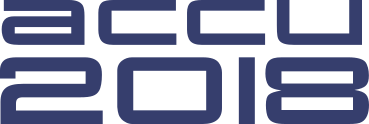
Simplicity: not just for beginners
Many people say that simple code is better code, but fewer put it into practice. In this talk I’ll spend a little time on why simpler is better, and why we resist simplicity. Then I’ll provide some specific approaches that are likely to make your code simpler, and discuss what you need to know and do in order to consistently write simpler code and reap the benefits of that simplicity. Code samples will be in C++ and some material will be C++-specific.
I'll be joined by dozens of amazing speakers and the topics will be wide-ranging. It's not all C++, and I'm looking forward to a little mind-expanding from some session I didn't expect to do so. The pub quiz and lightning talks will also be good fun. April 11th to 14th in Bristol - will I see you there? Kate
 Thursday, 19 October 2017
In 2016 I didn't speak at conferences because I was ill. I really enjoyed getting "back in harness" at CppCon this year ( my Guidelines talk has been uploaded already, if you missed it) and I am happily looking forward to my next two conferences. In Berlin I will deliver one of the keynotes for Meeting C++. It will be one of those opinionated talks with stories in it, plus code of course. I love giving those kinds of talks and they're typically well-received, so I am expecting to have a great time. This will be my first time at Meeting C++ and I know it will be a great conference. The next week, I will be at the 2017 C++ and System Software Summit in Beijing. 8 tracks and over 500 attendees; this is a big conference. I've never been to Asia before, so I am very excited to meet a lot of new people (and some I've known for a while, the speaker circuit is like that) as well as seeing new places and experiencing a new conference. I'm still thinking about what I will submit to ACCU for the spring. I prefer to do a new talk for each conference or at least to update existing talks dramatically. I will need to make up my mind before I leave for China! Kate
 Saturday, 23 September 2017
This week, I’ve been in Salt Lake City for the Pluralsight Author Summit and the first-ever PluralsightLIVE event. What a great time! This is my first time on a plane in over two years, and it is terrific to be out traveling again. Pluralsight takes great care of its authors and that started with a lovely box of goodies in my room the first night. 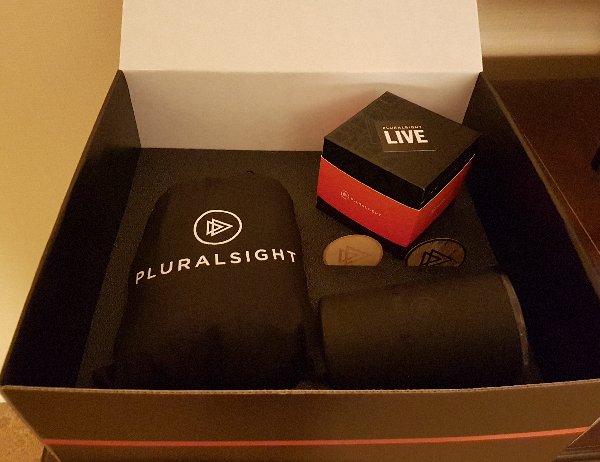
Tuesday we all got together to hear about the past growth and future vision for Pluralsight, and to get a sneak peek at some things that would be announced later in the week. And of course, for Aaron to get a selfie with the authors! 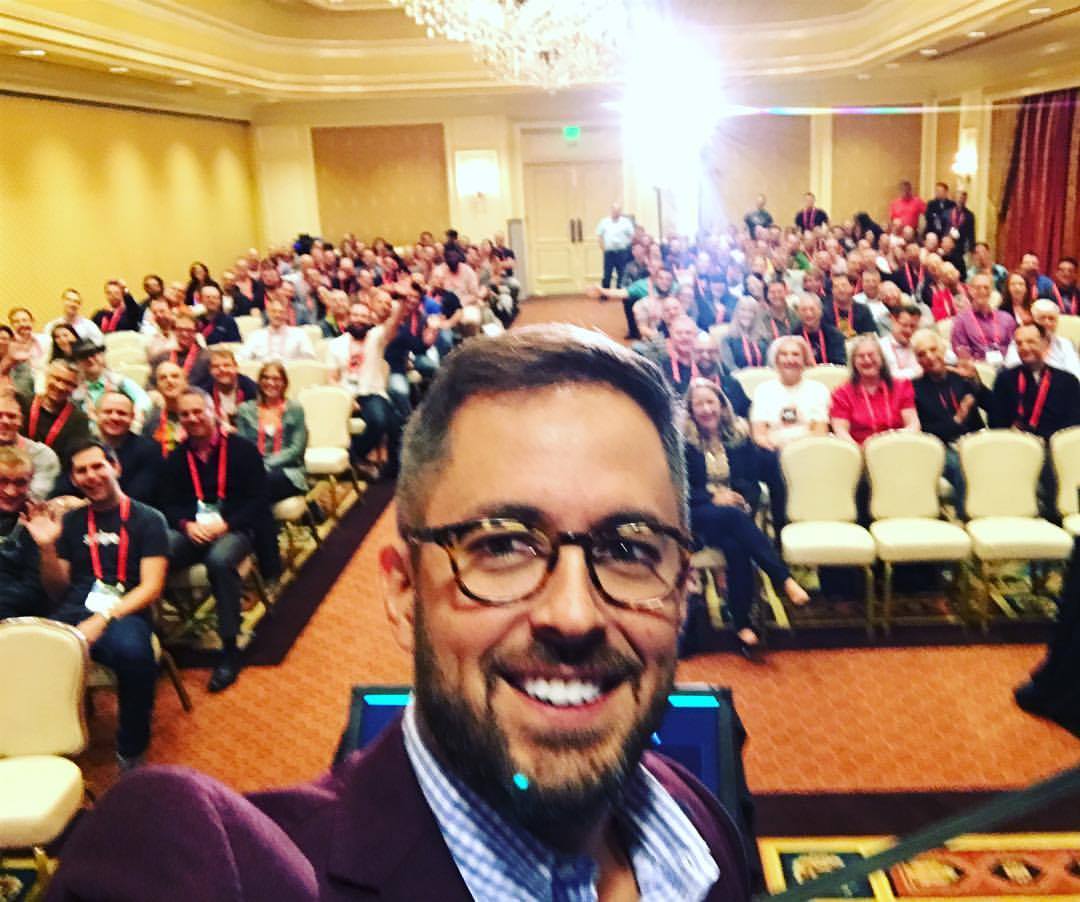
In the afternoon, we had open sessions where we learned from some Pluralsight staff we don’t normally get to meet, and from each other. What makes you a great author in the eyes of your editor and the other people who help to get your material published and live? How can you get your courses recorded faster? Geeky talk about microphones and other tools of our trade, of promo videos on YouTube, and so many other things we all really wanted to talk about. PluralsightLIVE itself started Tuesday night with a reception in the partner pavilion and an evening event I wasn’t able to stay up for. 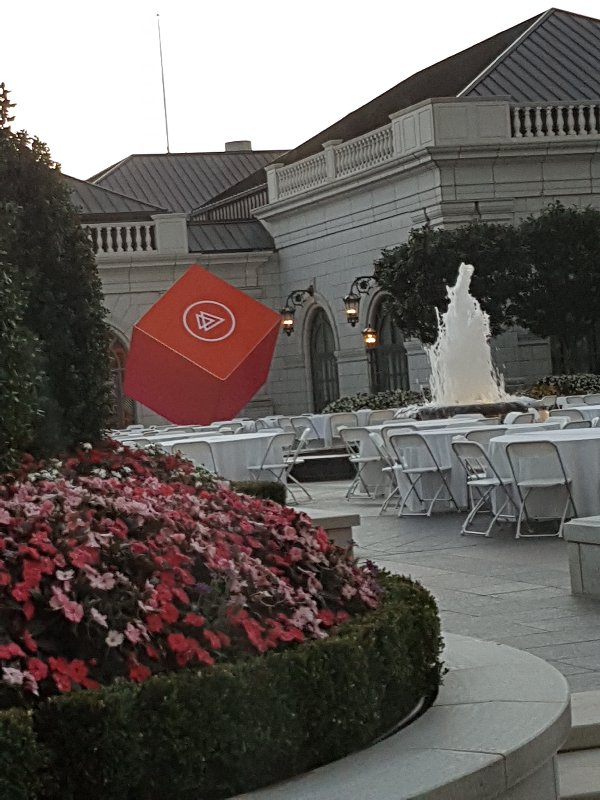 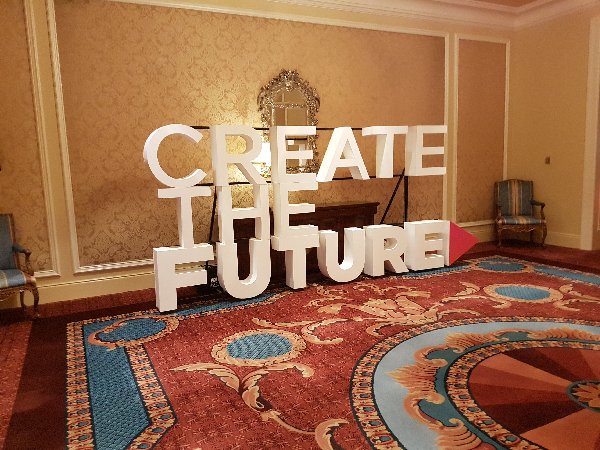 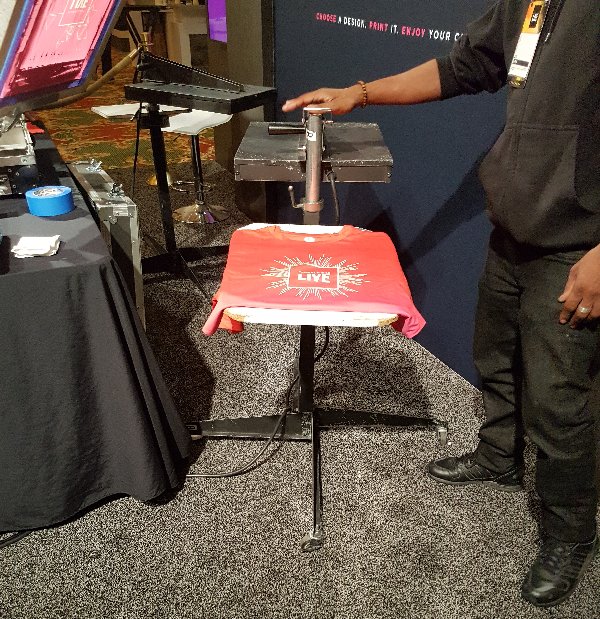
That's my shirt being printed on the spot for me!
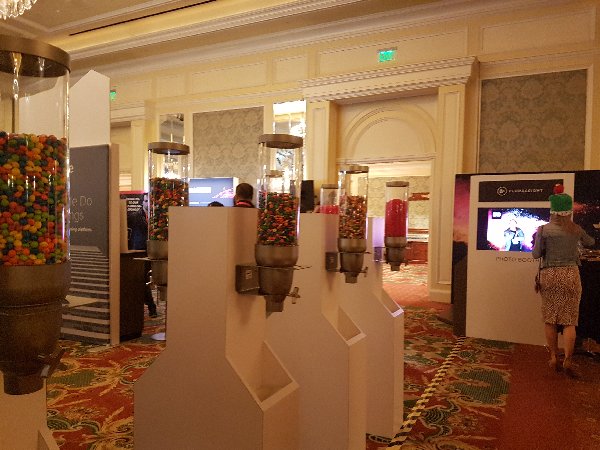 That's the very popular candy dispenser array.
I’ve been to a LOT of conferences and most of them look pretty generic. Here there was just so much effort showing: the fun activities like huge Jenga, Connect 4, and similar games, the couches everywhere (with power and USB ports so you could charge whatever you needed to charge), the large easy-to-spot-and-read signage, and more. It was clear the organizers were really caring about the wellbeing and happiness of all the attendees. There were a lot of keynotes. Wednesday and Thursday both had keynotes the whole morning, and Thursday also had an afternoon keynote. These were entertaining, inspirational, educational, and really worth my time. I was especially looking forward to Joel Spolsky on Wednesday morning and he didn’t disappoint. He was funny and open. He also announced that Stack Exchange users will all get 60 free days of Pluralsight training. I hope some of them use it to take my Stack Exchange course! Then he liked my tweet afterwards so that was fun. (If you want to take one of my courses, and don't have a subscription, there's a grey rectangle over the right that says Author: click it and you can get a ten-day free trial.)
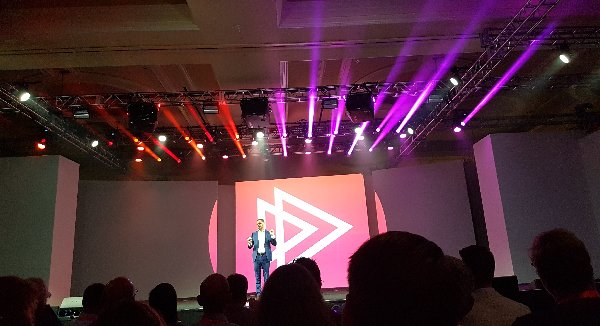
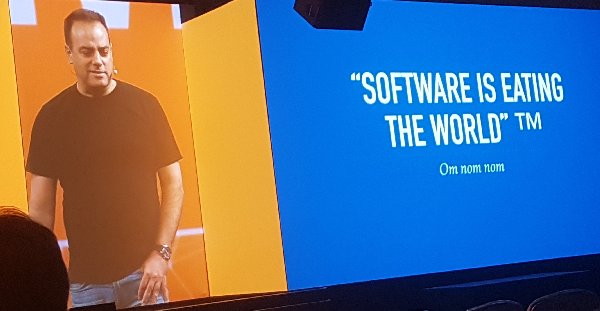 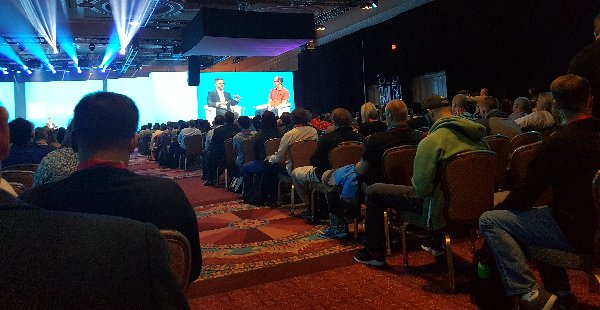 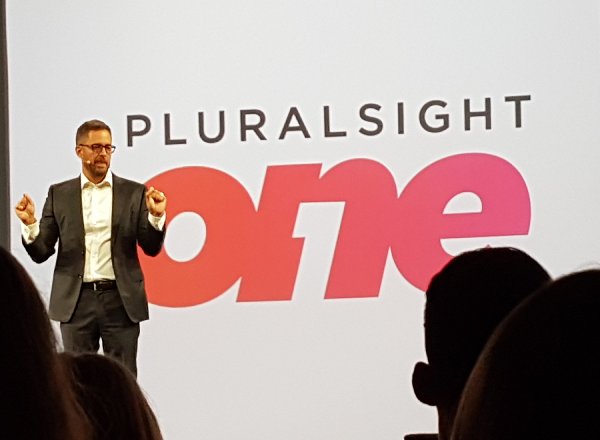
When I wasn’t in keynotes, I was meeting other attendees and Pluralsight authors. Many of the authors are friends I haven’t seen in far too long, so it was tough to tear myself away, but I forced myself, because meeting learners is what this week was about for me. It was especially helpful to talk to managers and team leaders who want to know how their people are using their subscriptions. The Pluralsight IQ announcement [link] was very well received both by learners who wanted to show off their scores, and managers who wanted to track a team’s progress. I took the C++ assessment, but I zipped through it a little too quickly and some questions needed more thought than I gave them. Still, I did ok: 
After I tweeted my results, a whole pile of my C++ tribe also got their scores, and I even outscored a few! (Plus, I think they found a few bugs in the assessment – I’m going to get them fixed.) The afternoon keynotes on Thursday wrapped up with Michelle Obama talking about diversity, education, children, and much more. I hadn’t heard her speak before other than sound bites on the news, and I was really impressed. She was warm and funny and willing to show irritation or frustration as well as the polished pleasantness I was expecting. 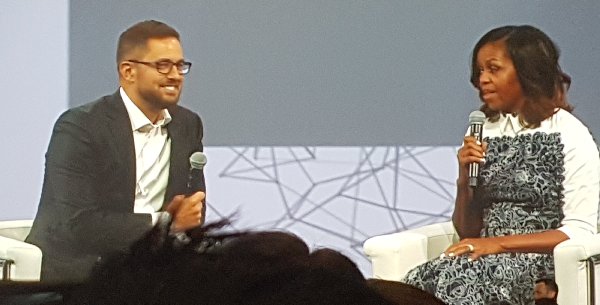
Next year’s dates have already been announced: the week of August 26th, 2018. I’m planning to be there. If you take Pluralsight courses (and come on, you should be taking Pluralsight courses) then consider it too. There was a lot of good content in a wonderful atmosphere, a chance to meet all kinds of interesting people, and a few days to put learning and growing front and centre – time well spent for me. Kate
 Monday, 11 September 2017
This year's innovation at CppCon is a Meet the Speakers Dinner Thursday night. It's pretty expensive ($100) because the venue is charging a lot for it, but here's your chance to relax over dinner with many of the speakers from CppCon. If you've registered for the conference but haven't bought a dinner ticket yet, please do! We want to meet attendees and this is a great way to do it. I've been an attendee at speaker dinners at other conferences and I have to say it's always been a highlight of the conference for me. Career advice from Bjarne himself over (excellent) dessert? Yes please!
I can't guarantee you Bjarne (or even me) but you will be asked if there's someone you want to sit with, and the organizers will do their best to accommodate you.
 Friday, 21 July 2017
I am happy to announce that my submission to CppCon has been accepted! 
10 Core Guidelines You Need to Start Using Now The C++ Core Guidelines were announced at CppCon 2015, yet some developers have still never heard of them. It's time to see what they have to offer for you, no matter how much C++ experience you have. You don't need to read and learn the whole thing: in this talk I am pulling out some highlights of the Guidelines to show you why you should be using these selected guidelines. For each one I'll show some examples, and discuss the benefit of adopting them for new code or going back into old code to make a change. Beginners who find the sheer size of the language and library daunting should be able to rely on the Guidelines to help make sane choices when there are many ways to do things. Experienced C++ developers may need to leave some of their habits behind. Developers along this spectrum could benefit from seeing what the Guidelines have to offer, yet the guidelines themselves are just too big to absorb all at once. My examples will be chosen to be beginner-friendly and the focus will be on what's in it for you: faster code, less bugs, and other tangible benefits.
I am so looking forward to seeing "my tribe" again in Bellevue this year. I'm going on the field trip too! If you haven't registered yet, get on that! Kate
 Saturday, 08 July 2017
I spent much of the spring working on this course, and am delighted to see it live!
Visual Studio 2017: Essentials to the Power User is 7 hours of good stuff you need if you're a Visual Studio user. My emphasis is on keeping you happy and productive by getting the tool to help you and showing you neat features you probably didn't know about. If you open that link in a new tab, you can play the course overview (a 2 minute "trailer") and look at the table of contents. I've done versions of this course for older Visual Studios and I get comments like "It's as though I have a whole new IDE" and "I've been using Visual Studio for years and you showed me things I didn't know, and I'm glad I do now."
I think debugging in general is not taught enough, so I'm happy to have 2 whole modules on it here - not on philosophy of debugging or how to narrow down a bug, but just on how to operate the machinery of Visual Studio's debugger. There's lots of it. Plus, if you have Ultimate, there's another half a module on "Historical Debugging", IntelliTrace. I also spend quite a lot of time on how to find your way around a large codebase with the various searching, finding, navigating and exploring capabilities that have evolved over time. Here's a quick topic summary: 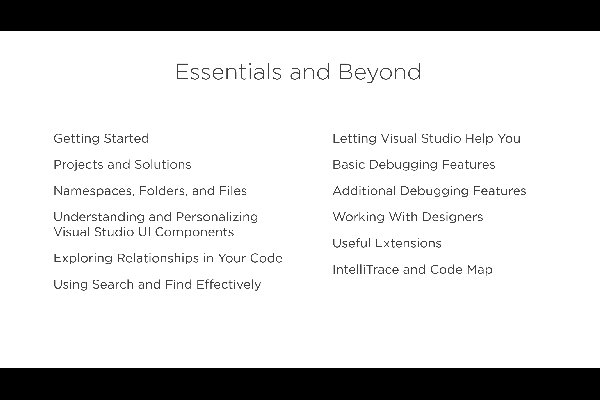
I really enjoyed writing this course and hope you enjoy watching it. If you need a free trial, look over to the right on this page for the grey rectangle that says Author and click for a 10 day trial. Kate
 Wednesday, 05 April 2017
Well, this is exciting!
 I was nominated, along with scores of others, but wasn't sure my nomination would succeed, partly because I was so much less active in 2016, and partly because my focus on client development in C++ is not always front-and-centre these days. But I'm happy to report I will continue to be a Microsoft Regional Director until at least June 30th, 2019.
What do RD's do? Well, I've explained this before: We don't work for Microsoft, we aren't really tied to regions, and we don't direct anything. Hence the name  . We are a group of business-oriented influencers who go beyond technical excellence to really make a difference. Chances are, you know many other RDs already. You see us on conference rosters (and helping to run them), running podcasts (DotNetRocks, among many others), running community events, leading companies that are moving the needle when it comes to what technology does for the world. The number varies each year as people shift roles and priorities, but it's typically between 100 and 200. Far less than the number of MVPs. It's a heck of a club to be part of, and I'm delighted that I still belong. . We are a group of business-oriented influencers who go beyond technical excellence to really make a difference. Chances are, you know many other RDs already. You see us on conference rosters (and helping to run them), running podcasts (DotNetRocks, among many others), running community events, leading companies that are moving the needle when it comes to what technology does for the world. The number varies each year as people shift roles and priorities, but it's typically between 100 and 200. Far less than the number of MVPs. It's a heck of a club to be part of, and I'm delighted that I still belong. Kate ps: If you're looking for me on the RD map, you have to look in Wales. Whatever mapping tech it's using just can't handle there being more than one Pontypool. Sorry about that. In reality I'm just outside Toronto, Ontario.
 Monday, 27 February 2017
Tl;dr – I
have (had?) Stage IV metastatic melanoma. This is a diagnosis whose current “5
year survival” rates are about 5%, meaning that 95% of people with this
diagnosis die in 5 years or less, generally a lot less, regardless of the
treatments they attempt: surgery, radiation, chemotherapy. However, that is entirely
based on people diagnosed more than 5 years ago, and everything has changed in
the last 5 years, making that number obsolete. I have had a very challenging
summer and fall 2016. I have a fantastic result though: using treatments that
have become available only in the last 5 years, I have seen my tumours shrink, and
many of them disappear. My symptoms are almost
all gone, I am not taking any pain medication, I am exercising regularly and my
energy levels are almost back to normal. My treatment continues, and my life is
not entirely normal, but it is amazingly great. I look forward to returning to
work, though I am still not sure when that will be. We live in the future.
So details,
for those who want details. In hindsight, my first symptom was fatigue in the
fall of 2015. I came home from an amazing 5 week transPacific trip, and within
days was in bed with a wicked cold we all called the Chilean Death Flu. When I
got over that, I had to work long hard days to get ready for CppCon, then was
at CppCon running days from 8am to 10pm or later, so not surprisingly I was
exhausted by the time that was done. But I never really got over that
exhaustion and got back to my regular energy. This is a hindsight thing,
because fatigue is a cancer symptom, but I never went to the doctor and said
“I’m so tired, let’s find out why.” In January after a dentist appointment, I
noticed a slight lump and soreness under my chin, but I forgot all about it as
the rest of my busy life continued to happen. By April, I had noticed it again (it
was larger) and this kicked off a round of medical things that just kept
escalating. Blood tests, ultrasound, cat scan, biopsies, more cat scans, pet
scans, MRIs, more biopsies – oh, many many more biopsies – and never any
conclusions. I had to cancel a headline appearance at an August conference, and
scale back my CppCon commitments a bit at a time, eventually deciding I
couldn’t even attend. Through all this, the lump, whatever it was, kept
growing. It was starting to hurt. Eventually, I had surgery to remove it,
enabling all kinds of tests to be run on the removed material. Throughout this
I kept the process private, discussing with only my very closest family
members. Because I didn’t know what I had, I didn’t want to tell colleagues,
clients, conference organizers or even friends “I may be sick, or not, and if I
am it could be anything.” So I kept it to myself.
It was
September when I officially got the news. The now-removed lump was melanoma.
Since it wasn’t presenting on the skin (as a mole or other visible surface
blemish), it was a metastasized melanoma. And since the cat scans showed that
lumps (growths, nodules, masses, lesions – doctors almost never say tumour) were
also in my lungs (and getting larger between scans), it was Stage IV, and
distant. Here’s Wikipedia on the matter:
When there is distant metastasis, the cancer is generally
considered incurable. The five-year survival rate is less than 10%. The median
survival is 6–12 months. Treatment is palliative, focusing on life extension
and quality of life. In some cases, patients may live many months or even years
with metastatic melanoma (depending on the aggressiveness of the treatment).
Metastases to skin and lungs have a better prognosis. Metastases to brain, bone
and liver are associated with a worse prognosis. Survival is better with
metastasis in which the location of the primary tumor is unknown.
Literally every time I met a doctor in September, they told
me another place it had spread. There was the unknown primary, which my own
immune system had already cleared away. The neck lump. The lung tumours, first
detected in May and having multiplied and grown all summer. The liver. The
spine. The surgeon had no more to offer me – there were too many to consider
removing them. The radiation specialist also didn’t want to do anything – the
neck lump might come back, but “it’s not a survival issue,” he said, meaning
that I would doubtless die from the lung or liver involvement, or some other
new lump, long before any regrowth of the neck lump had a chance to hurt me.
And radiation to the neck would ruin my voice and quality of life. They both
repeatedly used the word incurable, just as Wikipedia does. One of them praised
me for crying “because it means you understand.” I made lists of paperwork to
update (our wills) and find (my life insurance policies) and started thinking
about what music I wanted played at my memorial ceremony. After all, those
facts are pretty cut and dried. If the median is 6-12 months, you have some
months. Maybe 18 months if you’re super lucky, maybe 3 if you’re not. It’s
actually a lot of work to “get your affairs in order” and I was super tired and
found thinking very difficult, so it was even harder than you would think it
would be.
But, here’s where things take a turn. The surgeon told me
that things have really changed for melanoma just in the last few years. That
great strides are being made. The radiation specialist told me that what I
needed was something systemic that would attack everything at once. They
referred me to a medical oncologist. And he was like no-one I have ever met.
For one thing, he looked at me – my face, not his feet or my
feet – when we talked. And he smiled. He told me I had come to the right place,
and that he knew what to do for me. He’d already run some tests on the lump and
ruled out one set of treatments, but felt I was a very good candidate for
another set. This involved being in a study, getting a treatment that was
technically experimental. (Technically because it involves combining two drugs,
both of which are already approved in Ontario for treating this, but the
combination is not. Since then, the combination has been approved in the US.
Things are moving quickly in this area.) He started talking about what
percentage of his patients survive and I interrupted him (probably a bit
sulkily, because honestly I wasn’t having a great month) and said “for a while,
anyway.” He grinned. “I have patients who I have to wait for them to die of old
age so I can declare them cured. That’s my plan for you.” So then that was all
three doctor’s offices that I cried in, but this time because he gave me hope.
So that brings us to the weird world of cancer and what
“cured” and “curable” and such mean. The gold standard is to simply be alive 5
years after you’re diagnosed. That is why diagnosing “early” increases survival
rates – not only because people live longer than they otherwise would have
(sometimes they do, sometimes they don’t) but because the survival time is
measured from diagnosis, not from when some particular stage is reached. If you
are diagnosed a year early and nothing changes about the age at which you die,
you still survived a year longer after diagnosis than you would have with a
later diagnosis. At first, there was so
little that could be done for cancer that basically you either lived or died,
and if you managed to still be alive after 5 years, you would almost certainly
go on to die of something else like a heart attack or old age. But now people
are being diagnosed so early, and even very aggressive cancers are being held
back for a while, that the 5 year mark isn’t necessarily a sign that you’re
cured. Doctors like to tell people they’re in remission if they don’t happen to
have any tumours at the moment, a word that carries with it a promise that the
cancer is pretty sure to come back later. You really can’t draw any conclusions
about cancer in general, but there may be some stats available about your particular
type and stage of cancer.
So, in order for the official cancer folks to think I’m
cured, I need to live 5 years after my diagnosis. It has barely been 6 months.
So I’ll be waiting a while on that. And anyway, some folks are now more
interested in “progression free survival” which is not only being alive, but
not “progressing” during that time – getting new tumours, or having your old
ones grow. You also hear about disease-free survival, which is having no
symptoms and no signs of tumours on your scans, and event-free survival, which
is not having “events” such as needing a surgery, or even reporting a
particular pain. There seems to be a belief that three years of disease free
survival after melanoma means you can relax, it’s not coming back. I guess for
me the clock on that has only recently started, but I’m getting ahead of
myself.
So, according to the current definition of cured, nobody
gets cured of what I have, because the people diagnosed 5 years ago and earlier
are the only ones whose outcomes are considered, and they pretty well all died.
(I’ve had friends tell me stories of people who died of melanoma 5 and a half
years after diagnosis, making them count as survivors in the cure math, but
not, in the end, surviving it.) So it’s incurable. But in the last 5 years,
they’ve started an entirely different kind of treatment, which works, and
people on this treatment see their tumours disappear and their symptoms stop
and they just return to their regular life. For how long? Well, it’s not
possible to know yet, since the number of people who have 5 years of disease
free survival, or even three, is very small. It seems like a forever cure. But
it can’t be declared one because there just hasn’t been enough time go by yet
to draw that conclusion. And that’s why the medical oncologist says he is
waiting for his patients to die of old age. Only then can he conclude they
never died of the cancer coming back.
Right, diversion
over, what is this treatment I was offered? The two drugs Ipilimumab and
Nivolumab. They are monoclonal antibodies. They work by getting your immune
system to remove the cancer. This is entirely different from chemo, which
poisons the cancer and most of the rest of you too. People's immune systems
clear away small cancers all the time. For example, I must have had a
"primary" somewhere on my skin. I never saw it, my doctor never saw
it, so I must have cleaned it up - although unfortunately not before it spawned
off some more cells. That’s normal, a melanoma forms, it gets tidied up. The observation on Wikipedia that people with
unknown primaries do better is probably related to people with unknown
primaries having a proven ability to clean melanoma away. The recent
breakthrough is understanding that when tumours get to a certain size, they
prevent the immune system from cleaning them up – they develop a sort of “cloaking
system” that keeps the immune system away. So these two drugs, one ramps up
your immune system and the other interferes with the preventing so the tumours
no longer defend themselves against (or hide from, or turn off) the immune
system. My body just has to do what it did before and clear it all away.
I am in a study because these drugs are not yet approved in
Canada to be used in combination like this, though each are approved alone.
They have already done studies comparing dose levels of the drugs and found,
rather unexpectedly to me, that people getting different doses have the same
success rate. This study is to see if they have the same side effects.
Personally, I consider that aim secondary to getting me cured, but that's the
technical aim of the study. The side effects from these drugs are all the same
- inflammation and overactive immune responses. That might mean a rash, or
swelling of something. If your eyes swell, that's not as bad as if your heart
swells, or your thyroid. I had to commit to being able to drop everything and
head to downtown Toronto if I get any kind of side effect at all. That means I
can't travel for the duration of the study. The side effects, I was warned, may
also keep me from working or from doing some of the things I normally do. So
far 100% of the study people get side effects, the issue is only how severe
they are. I may end up treated with steroids if they get too bad. As a side
note, I understand that these drugs alone (not counting the time and effort of
doctors, nurses, scan techs, and so on) cost about $200,000 a year. Being in
the study means that the study sponsor, not the Ontario health care system,
covers the cost of the drugs. There’s no cost to me for any of it; my only
expenses have been hundreds of dollars on hospital parking (don’t get me
started), cab and transit fares, and the occasional overpriced food and drink
from hospital food courts.
So far, I’ve been extraordinarily lucky about side effects,
having by far the least of anyone in the study locally. I may have some thyroid
damage, but that’s all. Nonetheless the impact on my day to day life has been
total. Working became impossible – partly because I was constantly going to
downtown Toronto for appointments, and partly because of symptoms I began to
experience as the tumours grew and spread. In less than a week I went from
popping out for a 2 km hike while my Thanksgiving turkey cooked, to being
unable to get out of bed. I spent weeks at a time in bed. I spent almost a week
in the hospital after I got severely dehydrated, possibly because of the liver
involvement messing with my metabolism. I pulled muscles coughing (because my
lungs were full of tumours) and I may also have cracked a rib. I was taking
medications for pain and cough but I was very ill and very weak. I am lucky to
have a devoted husband who has put in incredible energy to give me the support
I needed – looking after me at home, carrying more than his share of work both
at home and in our business, and driving me to all those appointments. I don’t
know how I could have coped without him. I also have a close corps of family and friends who cheered me up over email and Skype, and took care of things I couldn't take care of. I had to learn to let people look after me, which was a very difficult lesson. I haven't mastered it, but I've made some progress.
Then the treatment started to work. The way this shows up is
in the form of pain. The immune system starts to attack and clean up the
tumours. This is a good thing, but it involves swelling and increased blood
flow to the area and such, which manifests as pain. A lot of pain. But it was
weird, because we all knew this was probably a really good sign and reason to
be optimistic and hopeful. Within three weeks of the first treatment, my
symptoms began to improve. I had a setback with some hip pain that turned out
to be caused by tumours in my hip and leg bones. It’s unusual for melanoma to spread to arms
and legs, and more unusual than that to discover it from pain. It is typically discovered when your leg bone
collapses underneath you and you need emergency surgery with plates and pins
and things. They were worried I would break my leg, so I got radiation
treatment for a week to give those tumours specifically a hard knock back. The
radiation techs asked every day “you have pain meds, right? You have enough?
You need a refill?” and within a few days I found out why. The pain when the
radiation starts to blast the tumour apart, and the immune system comes
sweeping in to clean it up, is, well, memorable. And I know precisely how long
it takes my opioids to start working from when I take them, as a result.
Another diversion, this one on metaphors and visualizations.
I reject the war/fight/battle approach to diseases and to cancer. My leisure
time involves a lot of outdoor activity – bike rides, wilderness canoe camping,
hiking, that sort of thing. When you’re trying to ride your bike up a long,
steep hill, you are not in a fight with the hill. You are not battling the
hill. It’s simple: the hill doesn’t even know you are there. The hill doesn’t
care. The hill isn’t steep at you, for you, because of you. It just is. When
you’re paddling a canoe into the wind, the wind isn’t blowing in some sort of
spiteful attempt to keep you from that amazing beach campsite. The wind doesn’t
know you’re there, the lake doesn’t know you’re there. You can “win” or “lose”
– get to the top of the hill, make it to the campsite, give up and turn around
because there isn’t time to do it now – but the hill or the lake doesn’t win or
lose, or even engage in this alleged battle in any way. Things can be very
difficult without being a fight, a battle, or a war. In the same way, cancer
isn’t a side in a fight. My tumours aren’t trying to kill me. They aren’t
co-ordinating with other people’s tumours. There is no communication or
plotting between elements of my disease and elements of someone else’s disease.
Neither cancer in general nor my tumours in particular will feel some sort of
sting or loss when I “win” and they won’t exult if I “lose”. They aren’t battling
me, and it doesn’t really make sense for me to battle them. I can’t kick cancer’s ass because cancer is heartless,
mindless, assless. My metaphor is more about cleaning up. Something is wrong in
my body – things are growing where they shouldn’t, and this can be very
dangerous, don’t get me wrong. Growths that squeeze vital organs keep them from
working. Growths that eat a hole in my leg bone can result in the bone
crumbling and collapsing underneath me. This needs to be fixed. This needs to
be cleaned up. My immune system can do that, but it needs some help, and the
medication is providing that help. I can imagine the lumps and growths being
taken apart and tidied up by white blood cells and other immune components of
my body. When I feel the pain of a flare that indicates a response is
happening, I focus on imagining that process in action right where I’m feeling
the pain. I take care of myself, push myself hard when I need to, ask the right
questions, report the right details to those who need them, and do the work of
getting better. It is hard, really hard, and I do contribute to my recovery, as
well as being a very lucky person.
By December I really could tell I had turned a corner. I
wrote in a family email update:
My third
treatment is in the books and the fourth is scheduled for the Thursday before
Christmas. My first scan since the treatment began will be in early January,
and then I guess I will have an appointment where someone will tell me what
they see on the scan. My expectation is that they will see dramatic shrinkage
if not outright disappearance of all the growths and lumps I was told about
through the fall, putting me in the 80% of study members who “respond” to the
treatment. From my point of view, I ask “where is my cough?” – totally gone.
“Where is the belly pain at the bottom of my ribcage?” – totally gone and they
can poke my stomach in an exam and it just feels utterly normal like before I
was sick. “Where is my fatigue?” – gone. I am not napping. I am out of bed
every day and out of the house if I need to be. I can go shopping. Heck,
yesterday I went to Costco. That’s right, Costco in December. That probably
tells you all you need to know about my energy levels.
We then had
Christmas and New Years and I had a scan and met with my doctor – the grin on
his face as he came into the room told us all we needed to know. He actually
took us out of the exam room to see my before and after scans on a monitor. As
I wrote to family, quoting him:
“Here in
the lungs, this and this and this, these are tumours. These are blood vessels
don’t worry about those. That is a rib. Now over here see? The tumours are
gone. Here there was a big blob of something, that’s gone. Now down here to the
liver, see how swollen it was? On this side you can see it’s back to normal
size. And tumour here and here, over here now you just see a small shadow in
that place, probably a hole left behind when the tumour was gone.” And so on.
We
came up with a plan to wean off the pair of pain medications I was using, which
worked, and other than Tylenol for a headache occasionally, I am taking no pain
medications at all. The
radiologist opinion, which came later, is a little more conservative, but uses
the word “disappeared” fairly often, along with “marked improvement” and
“healing”. Overall, the reports show a very good response. Alas, the “whole
body” cat scan didn’t include my hip, so I don’t know how things are going
there. But my overall colour and energy makes it clear that I have had an
amazing response. They don’t see anything new. Everything they used to see is going
or gone.
The only
question remaining is how long to keep treating me for. We have switched, as scheduled, from Ipilimumab
and Nivolumab every 3 weeks to just Nivolumab every 4 weeks. I have had one and will
get at least one more treatment, then depending on the results of the scans
after those, they might stop or keep going to 4 treatments or as many as 13.
They really aren’t sure how long to treat people for. Some people are better
forever after just one treatment – these are folks with terrible side effects
who can’t have a second treatment. At first they kept treating people who could
tolerate the meds indefinitely, then they decided two years was sensible, then
one year, now … well, we’ll take it as it goes.
I’m still
essentially side-effect free. I’ve lost a lot of weight: 25 pounds or more
since the surgery, most of it in a single unpleasant month, and I had slowly
and deliberately lost 35 pounds over a few years before that. I am already
starting to regain some of my muscle, lost during all the bedrest. I am
sleeping well too, having finally shaken the effects of a lingering “Christmas
cold.” (It might have been the flu – there was an outbreak, and I couldn’t have
a flu shot this year because of the immunotherapy.) I am cleared to drive
again, since I’m off all my pain meds now, and I can have a glass of wine from
time to time should the mood strike me. My thyroid levels were low, so I’ve
started thyroid meds. They’ve come back to normal on the meds, and I don’t know
if that will end up a life-long thing or not. It’s a pretty minor effect
overall – plenty of women my age take thyroid meds every day. Low thyroid
levels cause fatigue and cold sensitivity, both of which I had in early
January, and which seem to have improved since I started the thyroid meds. I
had been losing hair, not at the levels you see for people on chemo, but
noticeable, and since I started the thyroid meds, that has gone back to normal too. I have enough energy that I could travel to Waterloo for a C++ Meetup in February, my first "public appearance" in perhaps a year.
So that is
where I am. My tumours are dramatically shrunken or gone, and may never come
back. Bone is growing back where tumours ate it. My symptoms are gone. I don’t
know how much longer I will be treated for, or whether more side effects will
still arise, but I can start to build my way back towards a more normal life. I
got better. I was told I had incurable cancer, Wikipedia told me less than 10%
survive it even for 5 years, I could expect to live for just months, and now, less
than 6 months after being told that, I’m better. It’s weird. Wonderful, but
weird. This is like being around when insulin was first being used, or antibiotics.
It changes everything. I should probably have been dead by now and instead I
feel the way I did before I knew I was sick, or perhaps even a little bit better.
I decided
to share all of this detail for a few reasons.
- People are
curious – I get emails asking if I’m ok, how am I doing, sending me good vibes
and such from folks who really don’t know what’s happening but know something
is. I would like all of them to know I’m ok now, even though I still can’t
travel.
- People are
unaware how much things are changing in the world of cancer treatment and
research. I still shudder to think what would have happened if I hadn’t ended
up referred to the particular doctor I ended up with, and had instead only been
offered the old (useless) treatment. I like sharing the success story so that
other people will know about it.
- It’s a very
happy story and everyone who knows the details is really happy to know them, so
why not share that more widely?
I will
still be less active than usual for a while, but I am working my way back to
being my old self.
Kate
 Wednesday, 04 January 2017
I had to curtail my activities pretty dramatically in the second half of 2016, even in areas like mailing list participation or answering questions on StackOverflow. I was beginning to wonder if I would qualify for Visual C++ MVP again without conference talks or some of my other usual activities. No-one should ever assume they will be awarded; the program is always changing and our lives are always changing, so anyone can find themselves out of sync with the requirements of a program. However, I'm happy to learn that I have been renewed for 2017 and will continue to be part of this active community.
Looking forward to a terrific 2017, Kate
 Friday, 16 September 2016
It has been a very busy summer for me. Mostly it's been great, with family visits from all over the world and the wedding of my oldest child. But there have been some challenges, too. Without going into details, I've had to cancel plans to speak at (and even attend) CppCon. This is really sad - CppCon was the largest C++ conference ever when it started in 2014, and has grown remarkably ever since. It's a place where I learn new things, make new friends and contacts, and meet old friends for a wonderful week of laughter, in-jokes, and brain-stretching. I am hoping that within a few months, I'll be "back in the saddle" again and planning a 2017 full of speaking and learning. In the meantime, I'll be following #CppCon on twitter, and watching the YouTube channel for new videos - the plenaries and keynotes get up really fast. If you're not there in person, be there virtually like me! Kate
 Friday, 29 April 2016
I've started a C++ column in Visual Studio Magazine. I'm sure you've read plenty of C++ columns in your time - I sure have! I wanted this one to be a little different. So, here's what I've decided to do. For each column, I choose a guidelines from the C++ Core Guidelines, and then explain it. But the twist is that I'm not going through the guidelines from top to bottom - I'm picking guidelines whose explanations require a little language knowledge.
The first column just sets the stage and explains what I'm doing, and gives you a link to the Guidelines. The second, Don't Cast Away Const, explains the guideline, but also the consequences of const-correctness, a typical situation where you might find it hard to stay const-correct when you make a performance tweak to a running system, and the correct use of the mutable keyword. Not bad for explaining a four-word guideline!
I have a number of columns already written and plans to write more. Please check them out and spread the word!
Kate
 Thursday, 24 March 2016
My latest Pluralsight course is live! It's called First Look: C++ Core Guidelines and the Guideline Support Library and it introduces the guidelines and why you might want to use them, as well as some preliminary tool support. As always, if you need a free trial, use the link in the sidebar on the right. Pluralsight courses now have trailers. This is my first course with one and it turned out a lot better than I expected. You don't need a subscription to watch the trailer - just go to the course page, and over on the right side there are these downward pointing triangles next to time lengths. Click the one for Course Overview which is 1m 49s, and you'll see one entry under it that also says Course Overview 1m 49s.  Click that and the player will open and play the trailer. I did the voice recording, and some Pluralsight elves put together visuals (some are excerpts from demos) around it. I like it! Let me know what you think. Kate
 Monday, 29 February 2016
I’ve been hearing that the new search and browse
functionality on Pluralsight isn’t working for everyone, and that the sheer volume
of courses makes some hard to find. So I thought I’d make a list of my current
courses in the hope of simplifying things for those who want to learn something
specific.
Visual Studio 2015: Essentials to the Power-User
This is the most recent Visual Studio course and it starts
at the beginning and goes well past what most people know about Visual Studio.
I’m confident that even if you use Visual Studio every day, you’ll learn
something in this course that will make you more productive.
What's New for C++ Developers in Visual Studio 2015 Preview
This course was based on the preview, but works well against
the RTM version of Visual Studio 2015. It’s C++-focused and just shows you what’s
new compared to Visual Studio 2013.
Using StackOverflow and Other StackExchange Sites
Most developers find StackOverflow results whenever they do
a web search for a particular error message, or some API they’re having trouble
using. Many of them tell me that when they try to sign up and actually ask and
answer questions, they have an unpleasant experience. Often, it’s because their
mental model of the site does not match the way it actually works. This course
will show you how it works, so you can get the answers you need and not feel
rejected or hurt by the way these sites work.
Learn How to Program with C++
This course is aimed at people who have never programmed
before. If you’ve programmed, in any language, consider C++ Fundamentals
instead. If you don’t believe anyone can learn C++ as a first language, I’m
ready to argue with you. Modern C++ is a simple and useful language that a
beginner can learn and use well.
C++ Advanced Topics
This course is for the material I couldn’t fit into C++
Fundamentals. It’s presented as a number of things I want you to do, or stop
doing, when you write C++ today:
- Avoid Manual Memory Management
- Use Lambdas
- Use Standard Containers
- Use Standard Algorithms
- Embrace Move Semantics
- Follow Style Rules
- Consider the PImpl Idiom
- Stop Writing C With Classes
C++ Fundamentals and C++ Fundamentals - Part 2 These courses were written in 2011 but hold up well. Here is
where you’ll learn the basic syntax of the language and how everything works,
including templates, pointers, lambdas, and exceptions. Watch both parts to
learn the whole language, then dive into C++ Advanced Topics to round out your
C++ knowledge.
I have other courses – on older versions of Visual Studio,
for example, but these are the “big” ones for me at the moment. I hope this
list helps you to find them. And remember, if you need a free trial, use this
link. Click
Subscribe, then Start 10-Day Trial, and you’ll be all set.
Kate
 Friday, 26 February 2016
Our
longest-serving employee, Joyce MacDonald, has worked her last day with us.
She’s moving away to the other side of the country, where I don’t doubt another
firm will soon find themselves blessed with her skills. Joyce joined us full
time 16 years (and one month) ago, and had been working part time for us long
before that. From the very beginning, every task that she took on she
transformed and improved. We needed data entry when we were building a website
for a local real estate firm; she took the procedure for adding a listing and
kept streamlining it – open these three files at once, copy this once, then
paste it here, here, and here – until she had cut the target time in half and
then in half again. Later, she helped to develop our Quality Procedures and to
bring order to chaos in our software development process as we moved to agile
and changed our client mix. She helped our developers to become more organized,
to report progress more thoroughly, and to test before committing or deploying.
She trained our clients to think about what they really needed and to consider
the consequences of what they were asking for. I have never met anyone who
cared as much about the success of the firm as Joyce. We’ve employed dozens of
people who’ve done good work, worked hard, and cared about our clients. The
majority of them, like the majority of people everywhere, never gave much
thought to whether the company was doing well, except perhaps to wonder or
worry if their job was safe, or if there would be money to spend on perks. I’m
not complaining; I think that’s perfectly normal. Joyce is wired differently:
it’s fundamentally important to her that things are done right, that the client
gets what they want, and that the company makes a profit. That’s what just has
to happen, and it’s generally what she’s able to make happen.
Joyce
started doing data entry and office administration but quickly moved into more
complicated tasks. She’s been managing projects and client interactions for a
long time. She also made sure that people did what they were supposed to do
when they were supposed to do it, and kept everyone informed and contented. If
you’ve ever called our office, you’ve probably talked to her. She’s probably
reassured you about something and made sure it got taken care of for you. She
has her PMP now, which formally recognizes how well she manages projects, gets
requirements out of customers and organized in a way we can all understand, and
builds appropriate processes for developers to follow. She’s taken on the challenge
of managing not just seasoned, well-behaved, adult developers, but also
students and our own grown children, who are not always easy to control. Let’s
just say they meet their deadlines for her  . .
Losing
Joyce to the west coast hasn’t been a total surprise for us. When we came back
from the epic Pacific trip, she got the opportunity to move and though she
delayed it, we rather knew it was inevitable. Over the past 6 months or so
we’ve adjusted the balance of work we take on so that our remaining clients
will be those I can handle client support for, and whose projects I can manage.
(Brian will continue to be an architect, developer, and star debugger who
doesn’t have to talk to the clients.) For our clients, nothing much will
change. For us, there will be a hole in our lives – personally and
professionally – that will take a while to settle down. When she joined us,
Joyce was a neighbor (I believe we first met in the summer of 92), and for a
long time she walked or rode her bike to work in the office attached to our
house. Our kids have grown up together. When stuff happens, Joyce is the one we
talk it through with – business and not-business. We were able to go to the
other side of the world for five weeks, often with no internet, knowing the
company would tick along fine without us. It’s going to be an adjustment not
having her with us every day, not having her to count on. Still, we know why
she’s moving, and we wish her all the best in this new phase of her life.
Kate
PS: If
you’ve found this entry as part of due diligence in a hiring process, let me be
clear: Hire Her. You won’t regret it.
 Monday, 07 December 2015
The first keynote at CppCon this year was Bjarne Stroustrup (who invented the C++ language) announcing the C++ Core Guidelines. They are on Github and once he announced them, as Herb Sutter reported in the second keynote the very next day, they quickly became a trending topic across all languages. Here is a description of the guidelines from there: The C++ Core Guidelines are a collaborative effort led by Bjarne Stroustrup, much like the C++ language itself. They are the result of many person-years of discussion and design across a number of organizations. Their design encourages general applicability and broad adoption but they can be freely copied and modified to meet your organization's needs.
The aim of the guidelines is to help people to use modern C++ effectively. By "modern C++" we mean C++11 and C++14 (and soon C++17). In other words, what would you like your code to look like in 5 years' time, given that you can start now? In 10 years' time?
The guidelines are focused on relatively higher-level issues, such as interfaces, resource management, memory management, and concurrency. Such rules affect application architecture and library design. Following the rules will lead to code that is statically type safe, has no resource leaks, and catches many more programming logic errors than is common in code today. And it will run fast - you can afford to do things right.
To me, these guidelines are the key to getting across my fundamental message that C++ does not have to be hard, scary, complicated, or dangerous. The language may still say “it’s your foot!” but the guidelines, and the tools they can drive, are quite the opposite. You probably know that Visual Studio has a static analyser built in. (You should, anyway, I’ve blogged about it.) It will catch things like this: int* p = nullptr;
*p = 10; But it doesn’t mind things like this: int arr[10];
int* p2 = arr; Two lines, two violations of the guidelines – I’m not initializing any of the elements of arr, and then I am using its address as a regular old pointer. Now, there’s nothing wrong with regular old pointers – some people have got quite a hate on for them with the rise of genuinely smart pointers, but pointers are fine. Using pointers to control lifetime isn’t fine, because it’s impossibly difficult. But pointers themselves are fine. What’s not fine here is the “decay” of an array into a pointer – folks from other languages don’t expect that at all, and some marvelous bugs have hidden behind this simple bit of helpfulness from the compiler. So there’s a guideline that says don’t do that. Specifically:
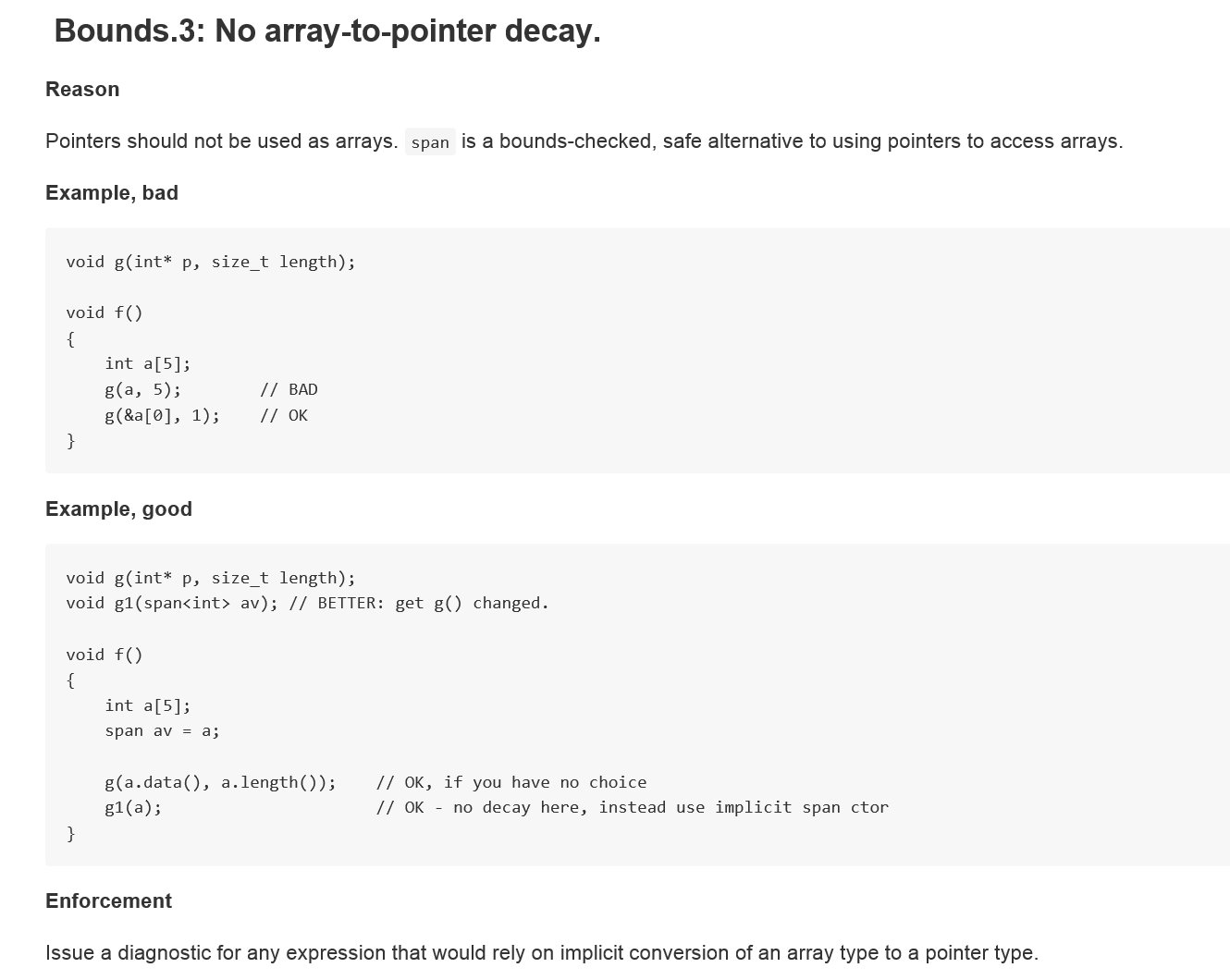 (I’m giving you a picture of code because if you want to copy and paste you should go to the live, always updated, guidelines on github.) This guideline is part of a “profile” – a particular set of rules that are designed to be enforced and that are supported by tools. Well, when I say tools I might be overstating the case a little. There’s just one tool at the moment, but that could be enough! This tool, C++ Core Checker, is on the NuGet Gallery. You don’t have to get it from there though. You get it, and use it, from inside Visual Studio 2015. Any version will do. If you don’t use Visual Studio normally, just get and install the Community Edition, which is free and is ok to use for commercial purposes, from https://www.visualstudio.com/ . (Need the fine print? if you’re using it as a person, you can do whatever you like. If you work for a company with less than 250 PCs and less than a million dollars US in revenue, again you and up to 4 of your coworkers can use it for whatever you like. If you work for an “enterprise” company then any and all of the employees can still use it for learning purposes or to work on open source.) Note that Visual C++ isn’t part of the Typical install, so you’ll need to choose Custom and select Visual C++: 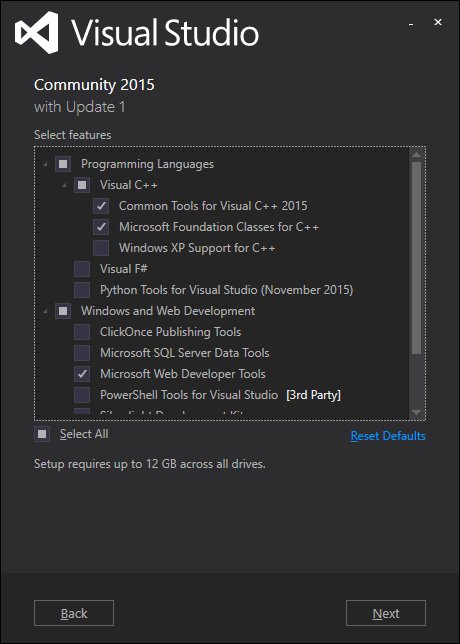
So once you have Community Edition or some edition of Visual Studio, make a console application and put in the two bad lines of code. Build it and then also run static analysis on it (On the Analyze menu, choose Run Code Analysis, On Solution.) You won’t get any warnings or errors. That’s your pre-guidelines life. You’re doing something inappropriate and nobody is telling you. Now, add the checker to your solution. This is solution-by-solution, not a change to how Visual Studio does static analysis. On the Tools menu, choose NuGet Package Manager, Package Manager Console. In the console window that appears, type Install-Package Microsoft.CppCoreCheck and press enter. You will see output like this: Attempting to gather dependencies information for package 'Microsoft.CppCoreCheck.14.0.23107.2' with respect to project 'ConsoleApplication1', targeting 'native,Version=v0.0'
Attempting to resolve dependencies for package 'Microsoft.CppCoreCheck.14.0.23107.2' with DependencyBehavior 'Lowest'
Resolving actions to install package 'Microsoft.CppCoreCheck.14.0.23107.2'
Resolved actions to install package 'Microsoft.CppCoreCheck.14.0.23107.2'
Adding package 'Microsoft.Gsl.0.0.1' to folder 'c:\users\kate\documents\visual studio 2015\Projects\ConsoleApplication1\packages'
Added package 'Microsoft.Gsl.0.0.1' to folder 'c:\users\kate\documents\visual studio 2015\Projects\ConsoleApplication1\packages'
Added package 'Microsoft.Gsl.0.0.1' to 'packages.config'
Successfully installed 'Microsoft.Gsl 0.0.1' to ConsoleApplication1
Adding package 'Microsoft.CppCoreCheck.14.0.23107.2' to folder 'c:\users\kate\documents\visual studio 2015\Projects\ConsoleApplication1\packages'
Added package 'Microsoft.CppCoreCheck.14.0.23107.2' to folder 'c:\users\kate\documents\visual studio 2015\Projects\ConsoleApplication1\packages'
Added package 'Microsoft.CppCoreCheck.14.0.23107.2' to 'packages.config'
Successfully installed 'Microsoft.CppCoreCheck 14.0.23107.2' to ConsoleApplication1
PM>
This changes your project settings so that analysis runs this Core Checker for you. Repeat the analysis step and this time the new tool will run and you will get output like this:
------ Rebuild All started: Project: ConsoleApplication1, Configuration: Debug Win32 ------
stdafx.cpp
ConsoleApplication1.cpp
ConsoleApplication1.vcxproj -> c:\users\kate\documents\visual studio 2015\Projects\ConsoleApplication1\Debug\ConsoleApplication1.exe
c:\users\kate\documents\visual studio 2015\projects\consoleapplication1\consoleapplication1\consoleapplication1.cpp(9): warning C26494: Variable 'arr' is uninitialized. Always initialize an object. (type.5: http://go.microsoft.com/fwlink/p/?LinkID=620421)
c:\users\kate\documents\visual studio 2015\projects\consoleapplication1\consoleapplication1\consoleapplication1.cpp(10): warning C26485: Expression 'arr': No array to pointer decay. (bounds.3: http://go.microsoft.com/fwlink/p/?LinkID=620415)
========== Rebuild All: 1 succeeded, 0 failed, 0 skipped ========== Where it says "type.5" and there's a link, that's to the specific rule in the "type" profile that this code breaks. And where it says "bounds.3", the same - I showed a picture of bounds.3 up above.
Isn’t that great? Come on, it’s great! The tool will add more rules as we move through 2016. I’m going to have a lot more to say about the Guidelines as well. But this is a great place to start.Why not point it at some of your own code and see what happens?
Kate
 Thursday, 26 November 2015
If you have an MSDN subscription, you know that it provides a number of benefits besides software licenses - you get Azure hours, you can use Visual Studio Online, and so on. Those are well worth the price of the subscription. But it also gives you access to a number of Pluralsight courses, completely free. If you have a Professional Subscription, you get access to 30 courses, and if you have an Enterprise subscription, you get access to 45 courses. (You want one of the over 4500 other courses? You'll need a full subscription, but you can buy that at 30% off, which helps.) And yes, my latest course, Visual Studio 2015: Essentials to the Power-User is one of the ones you'll get access to. So go, check it out! Kate
 Monday, 09 November 2015
I have a new Pluralsight course on Visual Studio called Visual Studio 2015: Essentials to the Power-User. It starts at the beginning, so if you're new to Visual Studio it will help you get started, but carries on "to 11" as it were, covering things many everyday users of Visual Studio don't know. Here are the modules, each with their length: - Getting Started (42:08)
- Projects and Solutions (13:23)
- Namespaces, Folders, and Files(27:03)
- Understanding and Personalizing Visual Studio UI Components (26:57)
- Exploring Relationships in Your Code(36:41)
- Using Search and Find Effectively(28:15)
- Letting Visual Studio Help You (46:28)
- Basic Debugging Features (24:04)
- Additional Debugging Features (44:30)
- Working with Designers (39:37)
- Useful Extensions (39:54)
- IntelliTrace and Code Map (25:57)
If you don't have a Pluralsight subscription, click the Author link over on the right hand side of this blog - click Subscribe, then Start 10-Day trial. That should give you a good idea of how valuable the subscriptions can be. (My company buys subscriptions for my staff, and I use my free author one all the time. It's a great way to learn a new technology.) My main goal in this course was to have Visual Studio make sense to the learner. There are so many ways to do any action that sometimes when you learn something it seems pointless, and you quickly get tired of learning an endless parade of similar features. I worked hard to put these into an order that would lead naturally through the capabilities of the tool, and put things in context. If you watch all 12 modules, you'll know more Visual Studio than most developers - and you'll have a productivity boost to show for it that should be pretty impressive! Please do give it a try. Kate
 Thursday, 08 October 2015
On the Pluralsight platform, subscribers can access a discussion area for each course. The traffic in mine is light enough that I have set up an alert to send me an email for each new comment. I just got one for my StackExchange course that brought a huge smile to my face: I have actually tried not to use Stack Exchange and stick to other sites. I had several bad experiences and have not gained any reputation at all on any questions that I asked. I have even deleted questions due to downvotes or other negative activity. Well after watching this, I understand the problems that I have had in the past. I really enjoyed hearing this and knowing the mechanics of how this works [...] I now know more about it to help me find the answers that I need when I am head scratching my way through coding.
When I first started reading I was thinking "here's a comment about how StackExchange is horrible and why have a course on it" - something I hear from some of my friends. But then it took a sharp right turn to the exact reason why I wrote the course. I mean this is exactly the persona I had in mind - someone who needs answers, but because of not knowing the way the sites work, not only isn't getting them, but is having an unpleasant experience and ends up avoiding the sites. When I decide to write a course I let myself imagine some possible outcomes. This comment is just the sort of outcome I was hoping for. It keeps me motivated to create more 
Kate
 Saturday, 26 September 2015
Back when I first started going to conferences, the
schedules typically ran 9 or 9:30 to 4 or 4:30. I used to bring a book to read
in the evenings in case I didn’t like what was on TV. Then I started getting
invited to dinners and parties and planning meetings and conference days got a
lot longer for me. But what I’ve noticed recently is that conference days are
getting a lot longer for everyone. People have come all this way and are
willing to pack a lot into each day. I’m writing this on the last day of CppCon
where there is content starting at 8am and running until 10pm. There's even content over the two hour lunch break! That’s
a long day, and a bunch of them in a row makes for a long long week. So here
are some tips for how to handle that kind of week. I’m going to be specific to
CppCon, because I think a lot of my readers should attend it, but other
conferences will have equivalents to everything I’m mentioning here; I’ll let
you do the mapping yourself.
First, have a schedule. Weeks before the conference, mark
out what talks you want to attend. Have a goal of selecting two talks in most
time slots. Then if your first choice is not as good as you expected, or the
room is full and you don’t want to stand, you know exactly where to go for your
second choice. Have that schedule in your pocket – on your phone, or on a piece
of paper – so you have no lost time figuring out where to go. (CppCon uses Sched, which mails you each day's schedule in the morning, making it easy to have with you.) Don’t be the
person who shows up at 9 only to learn there were sessions at 8. Check the
schedule at least once a day during the conference in case things are being
added. Tip: things are being added, you can count on it.
Second, plan ahead to take care of the physical body that is
carrying your brain from session to session. It’s really a simple matter to
have a few granola bars and a bottle of water in your bag. If you miss a snack,
you can still have something to eat or drink. Bring a light sweater in case you
are in the cold room. Bring some painkillers if you might get a headache from
sitting somewhere loud. Bring whatever little comforts you need to keep
yourself from getting whiny and leaving early to go to your peaceful hotel room
and watch TV. (That said, there’s always one day in a one-week conference where
I go back to my room for an afternoon nap. It’s the only way I can stay
functional during long and intellectually-intense days. Just make sure you’re
doing it for a brain recharge and not for something you could have avoided by
bringing a small item with you to the conference centre.)
Third, think about how you’re going to take notes. A paper
notebook? Bring a spare pen, too. Your phone? Your laptop? Or are you just
going to immerse yourself in the experience and use the videos if you want to
check something later? Whatever your plan is, bring what you need to be able to
use it. Power is always a challenge at conferences – I like to bring an
external battery for my phone so it can charge in my bag. Think about what your
bag is going to weigh and consider leaving the laptop at the hotel and getting
by with a phone and some paper for notes. It’s really liberating not to be
lugging a heavy bag, in fact surprisingly so.
Fourth, before you arrive (at the latest, on the plane to
the conference) write up your goals for the conference. Do you want to meet
people? Specific people, or some number of people, or people from a particular industry?
Do you want to learn something specific? (Perhaps this is the year to
understand SFINAE, or be able to follow along in a talk that includes template
meta programming, or “get” those Haskell jokes people are always telling.) Maybe you want to tell people about something?
Tweet some number of times? Blog some number of times? Have a plan. Have goals. Check yourself
against these goals each morning, and adjust your plan for the day if you need
to, so that you move towards those goals each day.
When you arrive at the conference, scout out the amenities.
Where are the bathrooms? Are there tables and chairs? Are there tables and
chairs with power? On Day 1, pay close attention to the food and drink pattern.
Is coffee always available, or only at certain times? Where does the food
appear? Knowing this will take away any worry you may be carrying around that
you may miss something and not get another chance at it. It will also save you
from taking extras of things and lugging them around all day when you don’t
really need them. I also like to work out patterns related to what rooms I’ll
be in – that I’ll be on the same floor all afternoon, for example. It just
makes me feel a little more settled and centred.
Looking after your body doesn’t stop with what you planned
and what you brought. I start each day with 5 minutes of stretching which makes
a big difference to how I feel all day. I also try to use the stairs instead of
the escalators – less lining up and it makes me feel better too. I go ahead and
eat the snacks, many of which are not part of my normal day (brownies in the
afternoon? bag of chips at lunch?) but not to excess. CppCon has fruit and
other options that are not all about fat, sugar, and caffeine, and it’s often a
smart choice to go with those rather than the straight-up treats. Try not to
get too far from normal. If you normally have 5 cups of coffee a day, then you
can do that during the conference, but if you’re a one-cup-a-day person,
perhaps don’t go beyond 2 or 3 a day while you’re here. Same advice for alcohol
– if you dramatically increase your consumption over the course of the week,
you’re likely to feel uncomfortable by the time Thursday or Friday rolls
around. The one thing you should be sure to take in more of than usual is water
– whether you’re eating more sugar than usual, drinking more caffeine and alcohol
than usual, or just walking a lot more than usual from room to room in a conference
centre, extra water is what you need to compensate. If you grab a bottle of
water at a snack break, hang on to it when it’s empty – typically most
conference rooms have a watercooler or bubbler by the door where you can refill
that bottle whenever you want. Can’t stand water? Bring something to flavour it
with – pick up some powders or drops at home and try them out to see which one
you like. It’s way more efficient than hanging around hoping that this is the
break they have juice at, or leaving the conference centre on a half hour walk
for a convenience store.
As the conference goes on, be aware of how you are spending
your time. For example, if you check your email during a session, but then take
a peek at Twitter, and then at your personal Facebook – are you even really in
the session anymore? Don’t be afraid to leave if this is not the session for
you. You can go to another one, or talk to other attendees out in the hall, or
go back to the hotel for a one hour nap. Almost anything is better than
ignoring a speaker and killing time on your laptop or phone. And if you’re not
prepared to leave, then perhaps you just need to start paying more attention to
the session – assuming it’s material you actually are interested in. Take a
look at those goals you wrote. Have you tweeted recently? Blogged? Learned that
thing? Met enough people? Will staying in this session and listening meet your
goals, or should you go out to the hall and work on a goal? Are you just
chatting with your own coworkers, or someone you’ve known for years? Building
and strengthening relationships is great, of course. That doesn’t mean that
discussing the football game with your cubicle-mate is a good use of your time
at a place you flew 5 hours to attend. Maybe you can walk around and find a way
to join a conversation with a speaker or someone else you wouldn’t normally
meet. Just standing there listening can be very enlightening even if you don’t
end up saying much.
If you’re not normally a tweeter, blogger, or
talker-to-strangers, a conference is a great place to start. There are
immediate benefits. Perhaps your question will be answered, or your point will
be repeated and quoted, or you’ll make a new friend or business connection.
This will give you reinforcement for doing that, of course. As you meet your goals,
make a record of that, so you can easily answer questions about what you
learned or accomplished during the conference. Consider writing a summary when
you’re done – for yourself, or for whoever funded the trip. A chronological
structure is natural – Monday morning I went to a talk called X and learned Y
or met Z, at lunch Monday I talked to A and B who encouraged me to look into C,
Monday afternoon I went to a talk on C – but be sure to have an executive
summary that reads a little less like a diary. Start writing it during the
conference and polish it on the trip home. Once you get back to the office,
writing that summary is going to get harder and harder, so don’t put it off.
Attending conferences is a great way to boost your career –
when you do it well you learn a lot in a short time, meet luminaries of your
industry and people just like you, raise your profile and your confidence, and have
a wonderful time. When you do it poorly, you get tired, hungover, lonely,
overwhelmed, and bored. Put in the effort to plan and prepare, and you will be
in a great position to reap the rewards.
 Thursday, 11 June 2015
One of the CppCon sponsors, Bloomberg, is running a contest for students in university or college and giving away trips to attend CppCon2015 in September in Bellevue, Washington: The series of seven weekly challenges will kick off on June 22, 2015, and each week contestants will be provided a different set of problems to solve via Bloomberg’s cloud-based CodeCon platform. Each week’s winner will earn a trip to CppCon in September. The list of seven winners will be announced and notified via email on August 5.
Interested? You should be. CppCon is a great experience for students and one you won't soon forget.
Kate
 Tuesday, 13 January 2015
ACCU has announced the schedule for their 2015 conference in Bristol, so I can announce that it includes me! 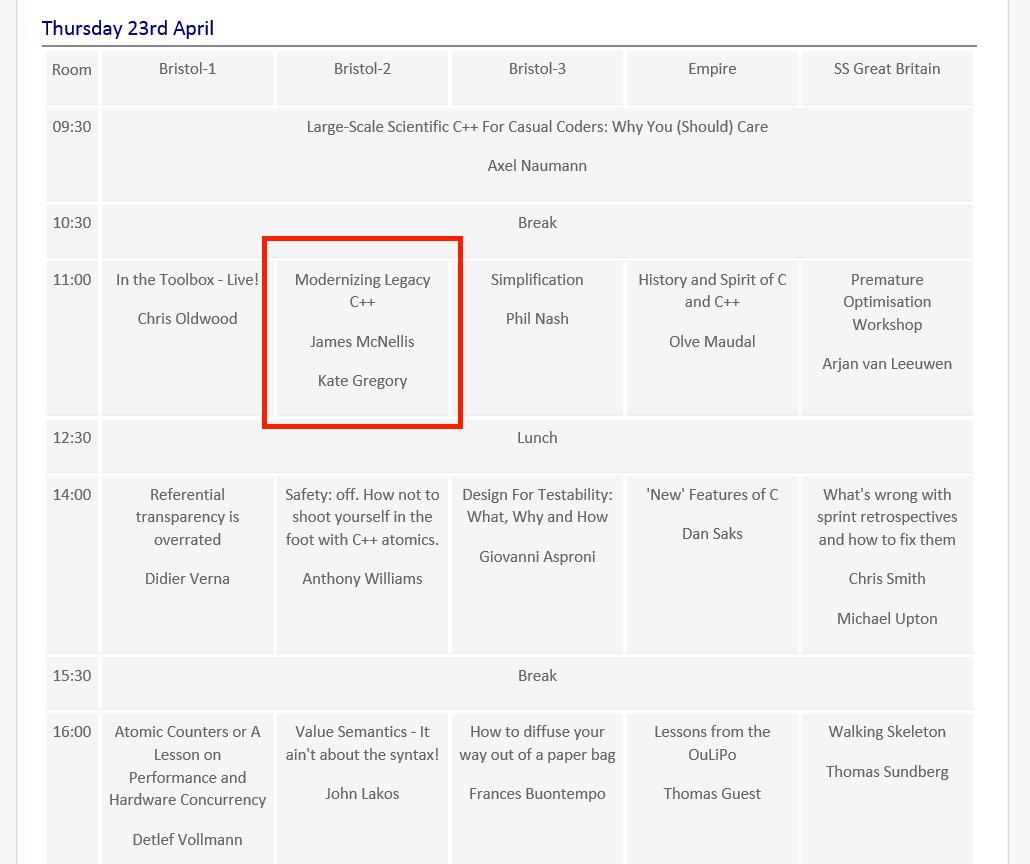
James and I are adding quite a lot of material, so if you saw this talk at CppCon, you should probably come and see it again at ACCU. Alternatively, you could come to the conferences and watch one of the conflicting talks and take excellent notes, because I really wish I could be at those as well! I first went to ACCU two years ago, spending my own money for travel and the registration fee. I enjoyed it immensely and learned a lot, so it's a real thrill to be speaking there this year. I can't wait! Early bird rates last till the end of February. Register as soon as you can, and I'll see you there. Kate
 Monday, 12 January 2015
My friend (and fellow Pluralsight author) Kathleen Dollard is coming to town, and will speak at the East of Toronto .NET User Group on "What's New in C# 6.0".
The next release of Visual Studio includes some major language enhancements that every developer should be aware of. Get up to speed on forthcoming enhancements quickly with this user group meeting from Microsoft MVP and language guru Kathleen Dollard.
Join us at 6pm at the Pickering Central Library! Please register at the Meetup page. See you there! Kate
 Wednesday, 24 December 2014
In my Pluralsight course, Using StackOverflow and Other StackExchange Sites, I cover all the things you really need to know to use the sites effectively and get answers to your questions, or a chance to show your skills. In the last module I explain how to help run the sites yourself, and I suppose you don't actually need to know that to use them - but knowing how they're run can help you understand what happens and why, so I included that material. I didn't include things that are really just for fun.
Right now, Winter Bash is on and it's just for fun. I made a quick video to show what it's about - take a look and let me know what you think. I hope to keep adding more "almost-great" items throughout next year. Kate
 Sunday, 07 December 2014
This fall has just flown by. One of the things I've been waiting for is my latest Pluralsight course, Using StackOverflow and Other StackExchange Sites, to go live. Here are the teaser images that I tweeted while I was writing it: 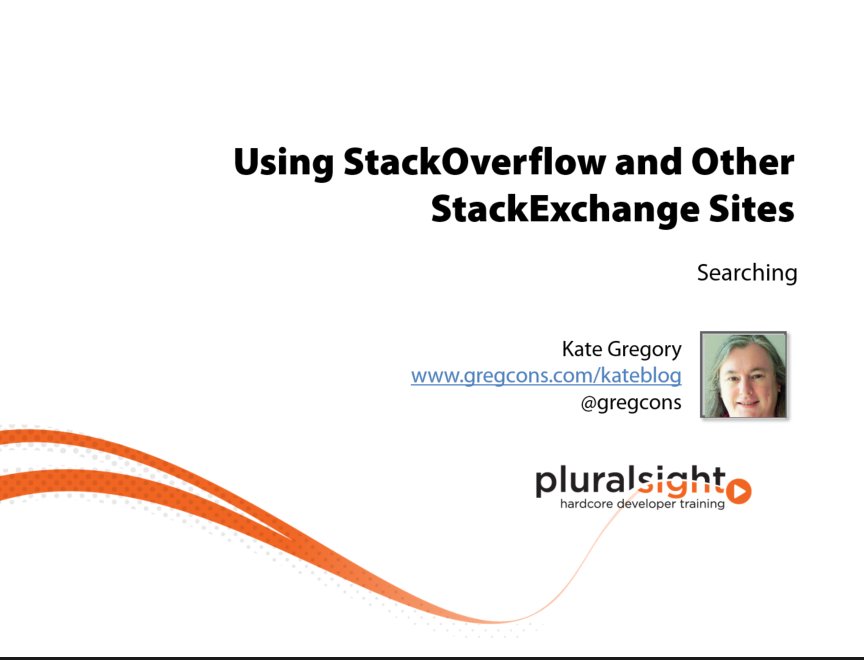 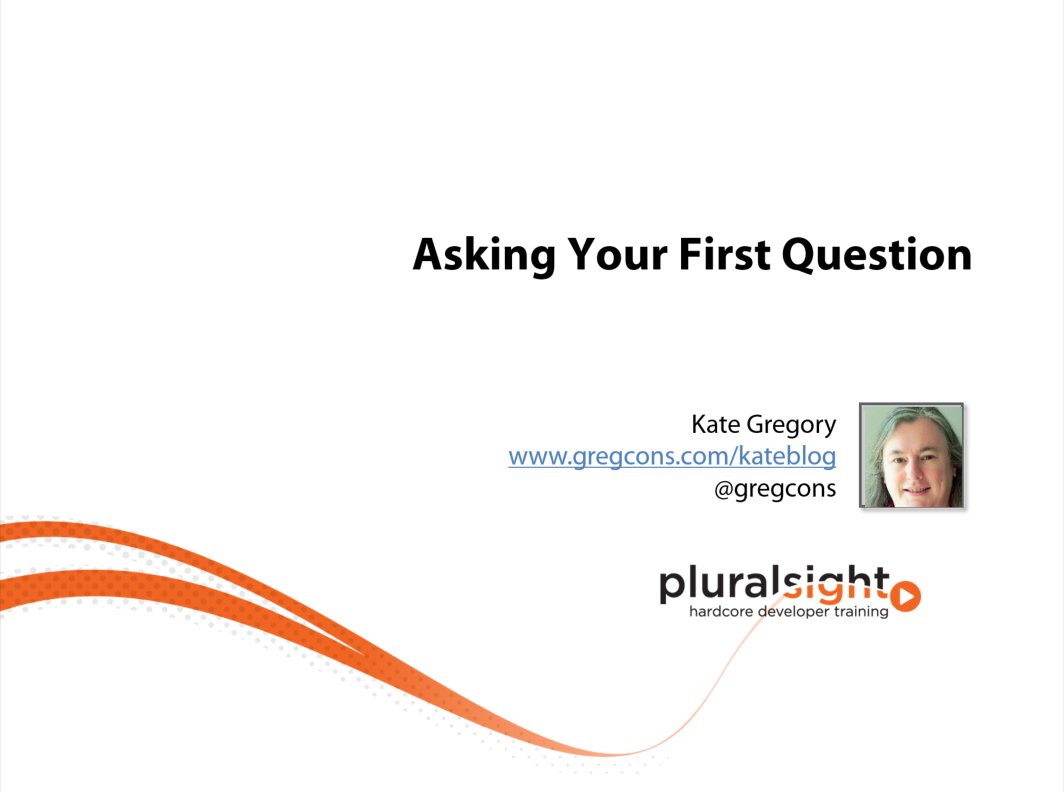 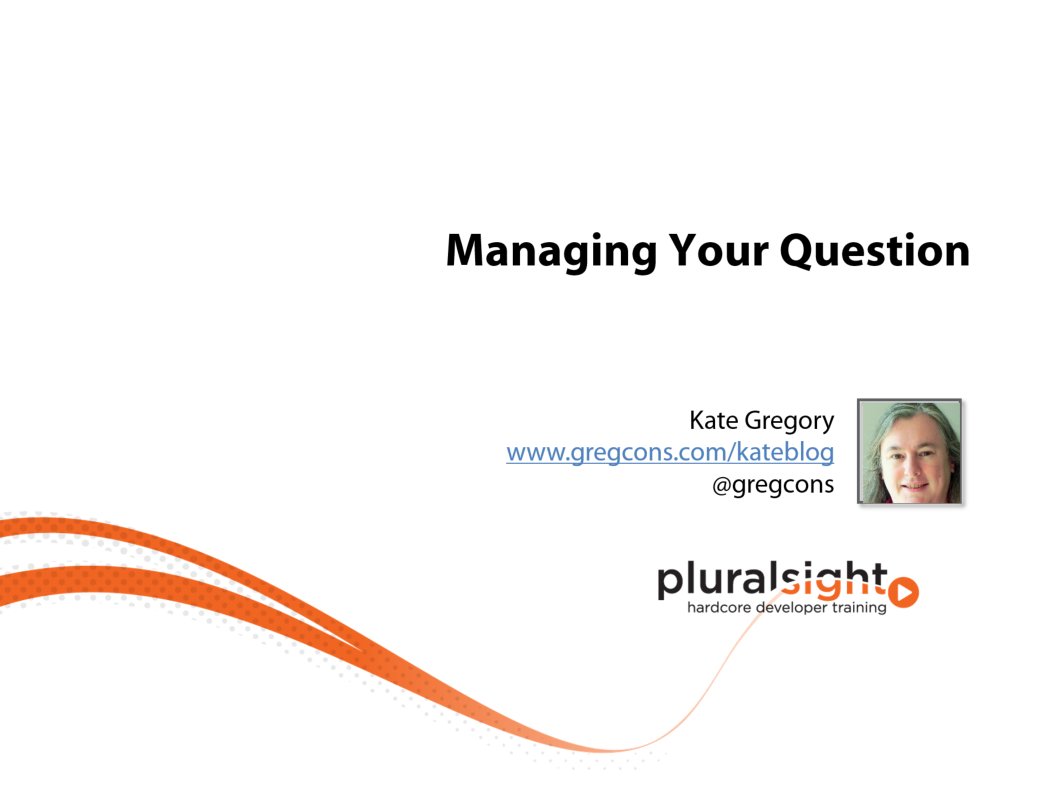 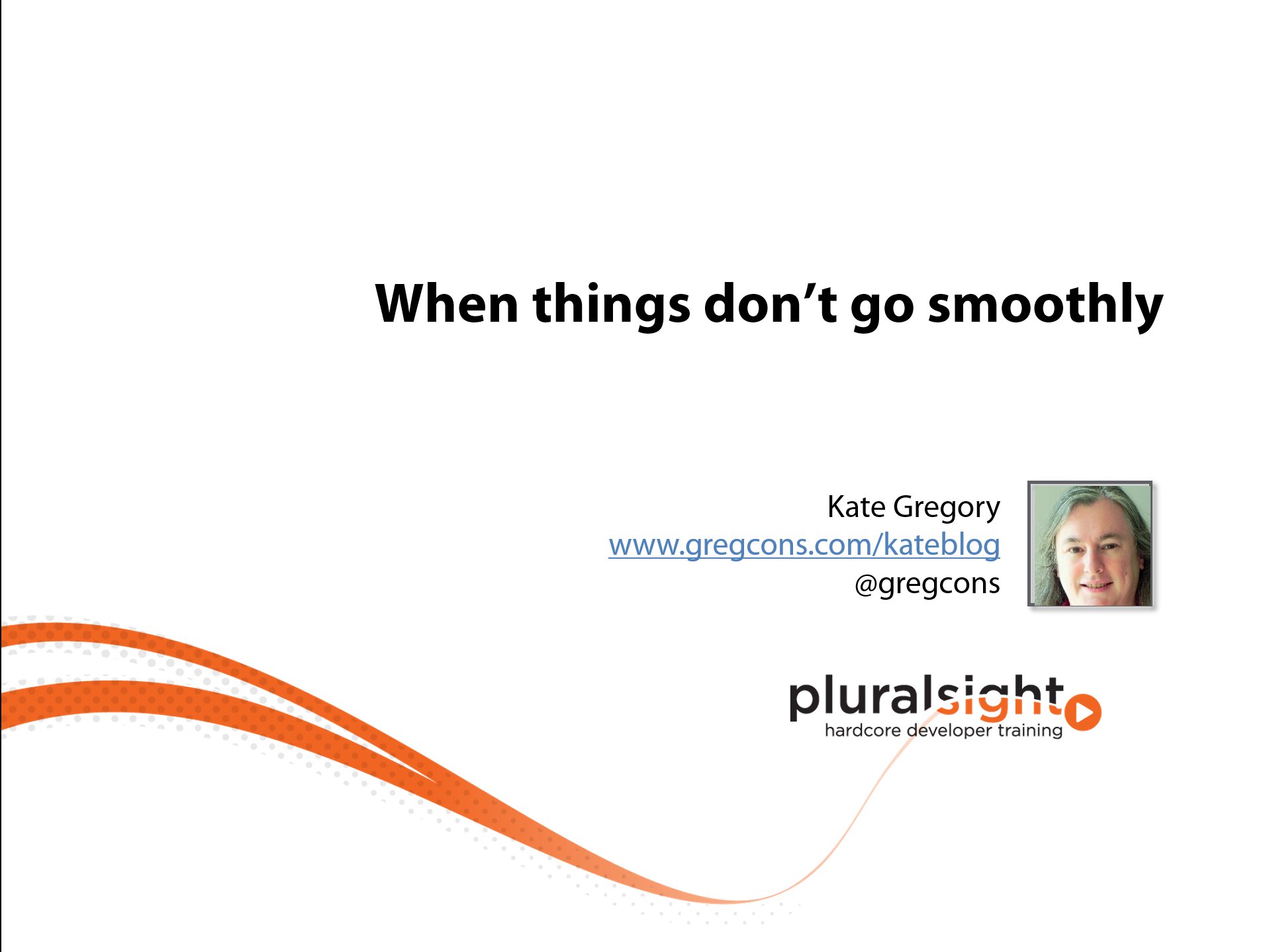 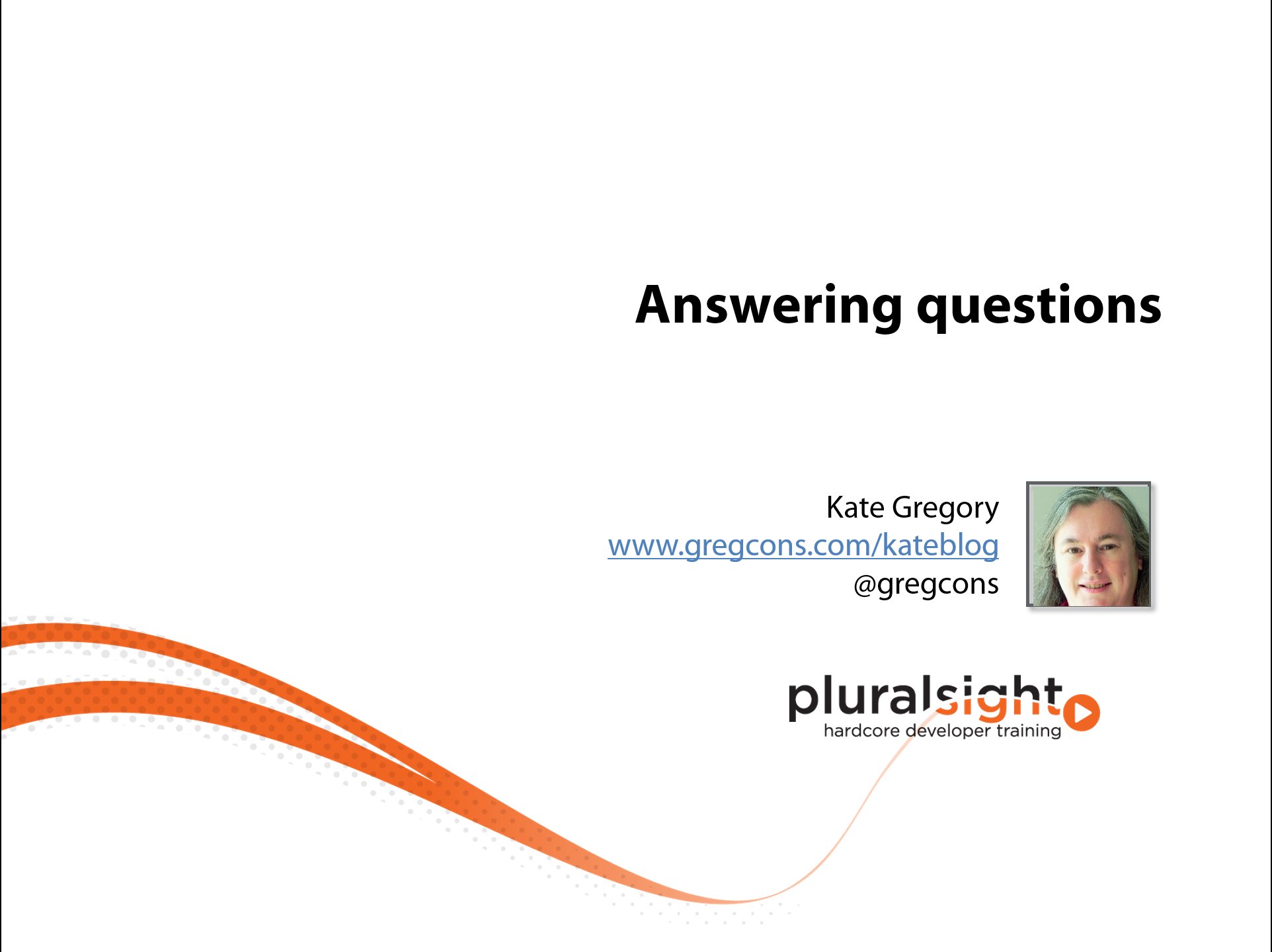 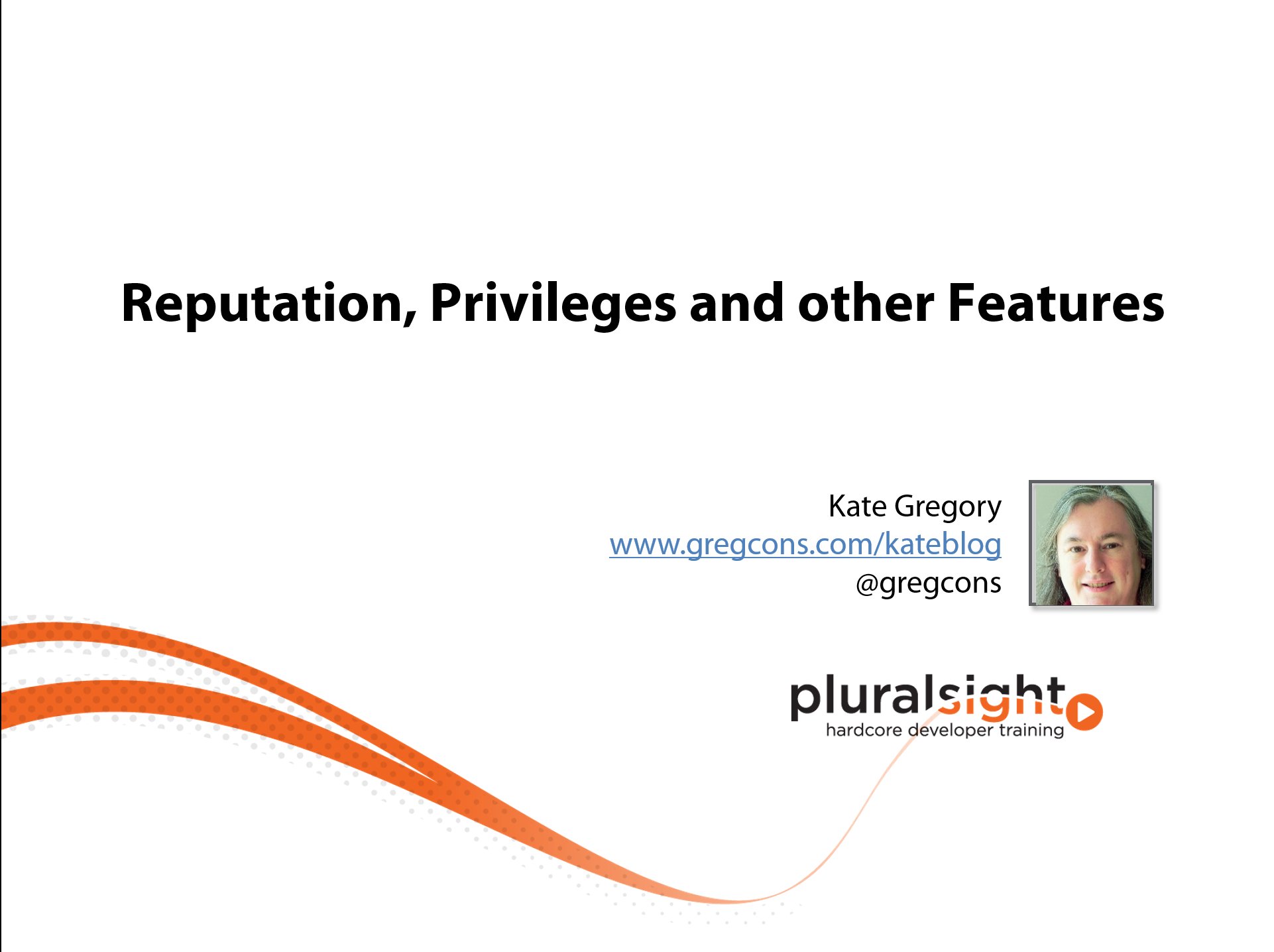 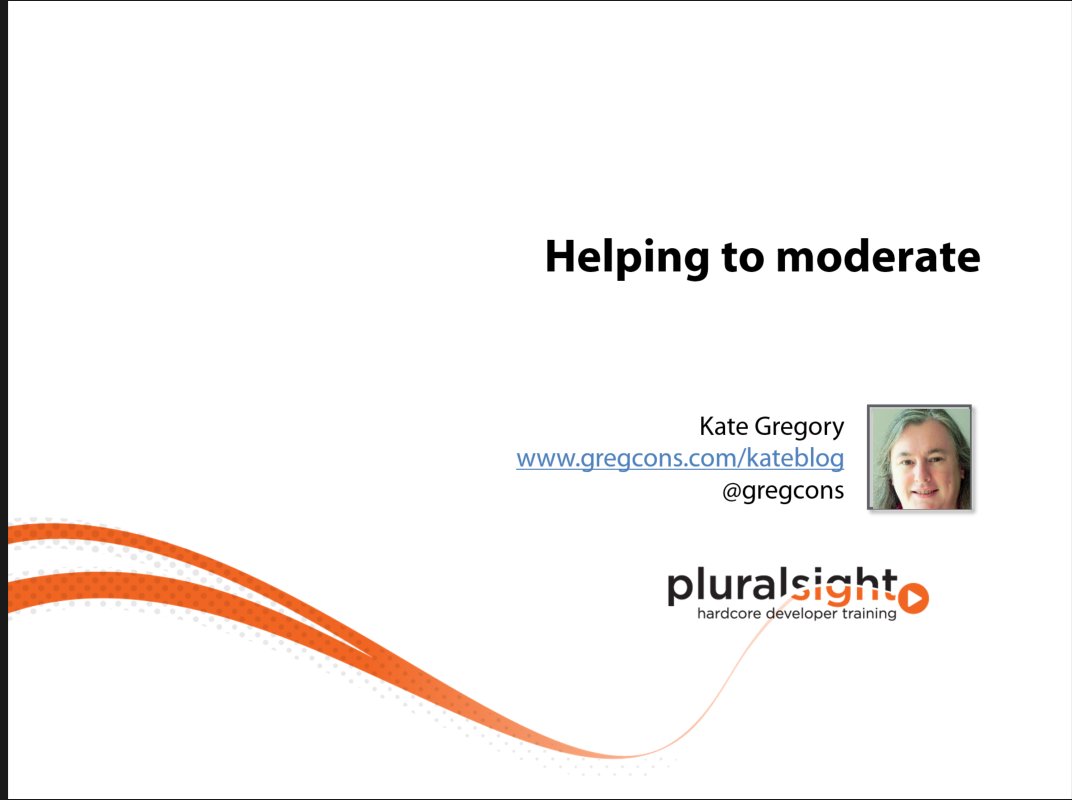 My motivation while I was writing the course was simple: help people really "get" the StackExchange model and the cultural norms of the people who help others on those sites. Some people get very frustrated if their questions are closed or downvoted, and often misinterpret the actions other site members take on posts. I wanted to explain the motivations behind some of the things that happen when you use StackOverflow or any other StackExchange site in a way that contradicts its cultural norms, and to show you how to get the absolute most out of the site. This includes specific tips like - Choosing a title that will get the most attention for your question
- Wording your question in a way that will prompt people to answer it
- Managing your question or answer after you post, and reacting to the reception it receives
I also cover badges, reputation, the privileges system, even the meta sites that are used to make decisions about the way the network of sites operates. I really hope this course leads you to a more productive use of the number one programmer resource on the planet - and perhaps one or two other sites in the network that cover an interest of yours, like travel, gardening, or gaming. If you don't have a Pluralsight subscription, you can sign up for a free trial and use that to watch the course.This is quite a change from my other Pluralsight courses, I know. StackOverflow has made such a difference in the way people solve programming problems that I really thought it needed a course. Let me know what you think! Kate
 Friday, 26 September 2014
One of the things I have to do a lot is send people a biography. Sometimes it's for a conference session, other times an interview, or for the "our team" section of a proposal I'm joining, and so on. You have to keep these things up to date, dropping old stuff and adding new, and nobody actually enjoys spending that time. I've had a written bio to use for these purposes for decades, and over that time, the reasons for using a bio have changed. In the past it would typically be used in written material, and often for business purposes with large, conservative, staid organizations - governments, enterprises, that sort of thing. So even though I keep it up to date with what I'm doing, it has a really formal tone that's a bit old fashioned: Kate Gregory is a C++ expert who has been using C++ since before Microsoft had a C++ compiler, an early adopter of many software technologies and tools, and a well-connected member of the software development community. She has over three decades of software development experience in a variety of programming languages including Fortran, PL/I, C++, Java, Visual Basic, and C#. Her recent programming work is almost exclusively in native C++ and C#, on a variety of projects, for both Enterprise and ISV clients. Since January 2002 she has been Microsoft Regional Director for Toronto and since January 2004 she has been awarded the Microsoft Most Valuable Professional designation for Visual C++. In June 2005 she won the Regional Director of the year award, and she was one of the C++ MVPs of the year for 2010. She maintains strong relationships with the C++, Visual Studio, and Windows teams in Redmond.
Kate is the author of over a dozen books, mostly on C++ programming: the latest, on massively parallel programming with C++ AMP, was published in fall 2012 by Microsoft Press. She teaches .NET, Visual Studio, and C++ (including online courses for Pluralsight) and is in demand as an expert speaker, with numerous cross-Canada tours for Microsoft Canada, and sessions at DevDays, DevTeach, TechEd (USA, Europe, Africa) and DevIntersection, among others. In 2014 she was Open Content Chair for CppCon, the largest C++ conference ever held, where she also delivered sessions. Kate is the founder of the East of Toronto .NET Users group and a member of adjunct faculty at Trent University in Peterborough. Her firm, Gregory Consulting Limited, is based in rural Ontario and helps clients adopt new technologies and adjust to the changing business environment. Current work makes heavy use of .NET and Visual C++ for both web and client development, especially for Windows 7 and 8. Managing, mentoring, technical writing, and technical speaking occupy much of her time, but she still writes code every week.
I've been meaning to do something about that for ages and I finally have! I've written a shorter, more informal introduction that focuses on what I think is important about who I am, instead of trying to get you to figure it out from a bunch of facts about me: Kate Gregory has been using C++ since before Microsoft had a C++ compiler, and has been paid to program since 1979. She loves C++ and believes that software should make our lives easier. That includes making the lives of developers easier! She'll stay up late arguing about deterministic destruction or how C++ 11 is not the C++ you remember.
Kate runs a small consulting firm in rural Ontario and provides mentoring and management consultant services, as well as writing code every week. She has spoken all over the world, written over a dozen books, and helped thousands of developers to be better at what they do. Kate is a Microsoft Regional Director, and a Visual C++ MVP, an Imagine Cup judge and mentor, and an active contributor to StackOverflow and other StackExchange sites. She develops courses for Pluralsight, primarily on C++ and Visual Studio. In 2014 she was Open Content Chair for CppCon, the largest C++ conference ever held, where she also delivered sessions.
What do you think? Better? Kate
 Tuesday, 12 August 2014
Earlier this year I flew to Utah for the Pluralsight Author Summit. Spending time with such a great collection of my friends and colleagues, and learning more about how to make a great course, was the real reason for the trip, but I got up early one morning to record a Play by Play video with Geoffrey Grosenbach. He has a genuine skill of getting you to demonstrate your own thought processes aloud and I've enjoyed watching other people's Play by Play sessions a lot. Geoffrey had arranged for some ancient C++ code for me to poke around in. Mike Woodring came through with the sample code from his 1997 book with Aaron Cohen, WIN32 Multithreaded Programming. Seventeen-year old code it may have been, but it turned out not to be quite as ugly as I would have liked. Still, we put it through its paces a little and talked about how I approach this sort of task. 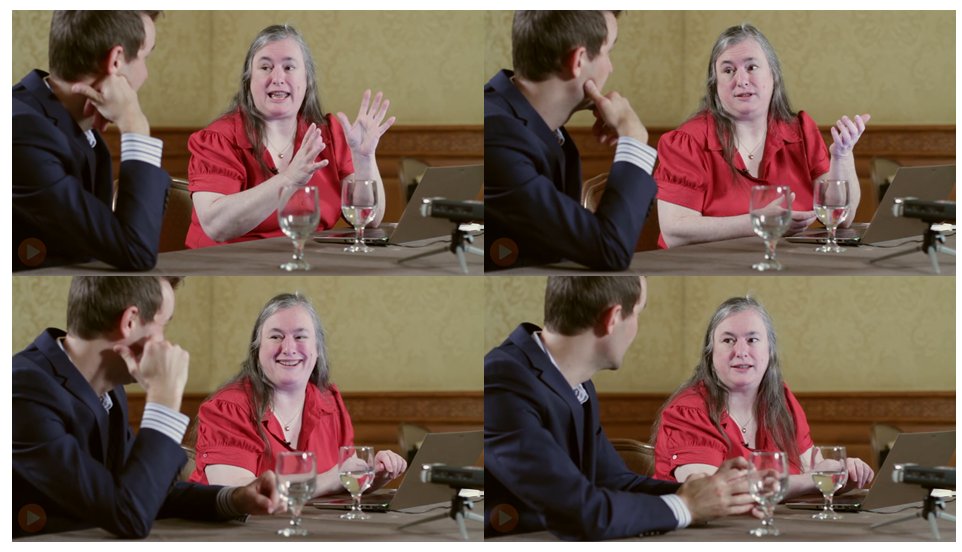
It came out to about 90 minutes overall so if you have a chance to watch it, let me know what you thought! Kate
 Sunday, 03 August 2014
How fun is this going to be? (A lot!)
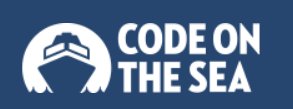
I'm going to speak at this next February! One of my big deciding factors was the other speakers. Erik Meijer, Greg Young, Michael Feathers, me, and one speaker still to be named. It's a small gathering to talk about software engineering. I'm still working on precisely what my two talks will cover, but expect it to include C++, legacy code, best practices, being "modern" in your C++, and related topics. Two days of intensive geekery wrapped around two days visiting the Bahamas! Space is still available so why not consider it? Brought to you by the Code on the Beach people, so you know they know how to do this. Kate
 Saturday, 02 August 2014
It's just around the corner - the largest C++ conference EVER with over one hundred talks! 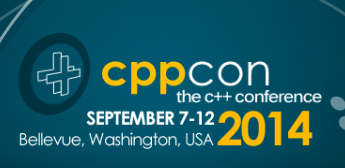
And two of those talks I'll be doing with James McNellis. We had such a good time presenting together for Microsoft Virtual Academy that we decided to do it again. How do these sound? Modernizing Legacy C++ Code
C++ is a programming language with a long, storied history spanning over three decades--four if one includes its C ancestry. The C++ language has undergone many changes during that time, compiler technology has advanced substantially, and computers today are very different from the computers of decades past. But despite all of these advances, there's an awful lot of C++ code in use today that looks like it was written in the 1980s. In some cases, the code was written in the 1980s and it's still in use; in other cases, it's recently-written code that just doesn't use modern style.
In this talk, we'll discuss some of the problems with legacy code, and review some practical techniques for applying principles of modern C++ to gradually improve the quality of legacy code and improve maintainability and debuggability. We'll show how some very small changes to code can yield huge benefits.
Making C++ Code Beautiful
Ask a non-C++ developer what they think of C++ and they'll give the language plenty of compliments: powerful, fast, flexible, and "the language for smart people". But along with that you are likely to hear ugly, complicated, hard to read, and "the language for smart people". Is it possible to write beautiful C++? Not arcanely elegant or wickedly compact, but readable, clear, expressive - beautiful! We say it is, and we want to show you how.
In this session, you'll see how to turn pages of "comic book characters swearing" into code you'll be proud to call your own. By making your code express your intent, using the power of new language and library functionality, and leaving hard-to-read constructs out of your vocabulary, you can give your code a makeover that will stand the test of time.
If you're not registered yet, there's still time! All five days cost $995 and there are one and two day passes available for less. You're going to want to meet and learn from the stars of C++ - check the full session list to read all about it. Kate
 Saturday, 14 June 2014
My latest Pluralsight course, Introduction to Visual Studio 2013 - Part 2 is live and ready for action. The modules are:
- Basic Debugging
- Additional Debugging Features
- IntelliTrace
- Working With Designers
- Extensions
If you haven't watched Part 1, you really should.
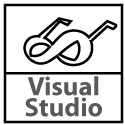
What's my next course? I'm trying to decide that at the moment and will let you know when it's underway.
Kate
 Friday, 23 May 2014
I've completed my development of my latest Pluralsight course and I'm just waiting for it to go live. Here are the "teaser" images I posted to Twitter and my public Facebook page as I was developing it:  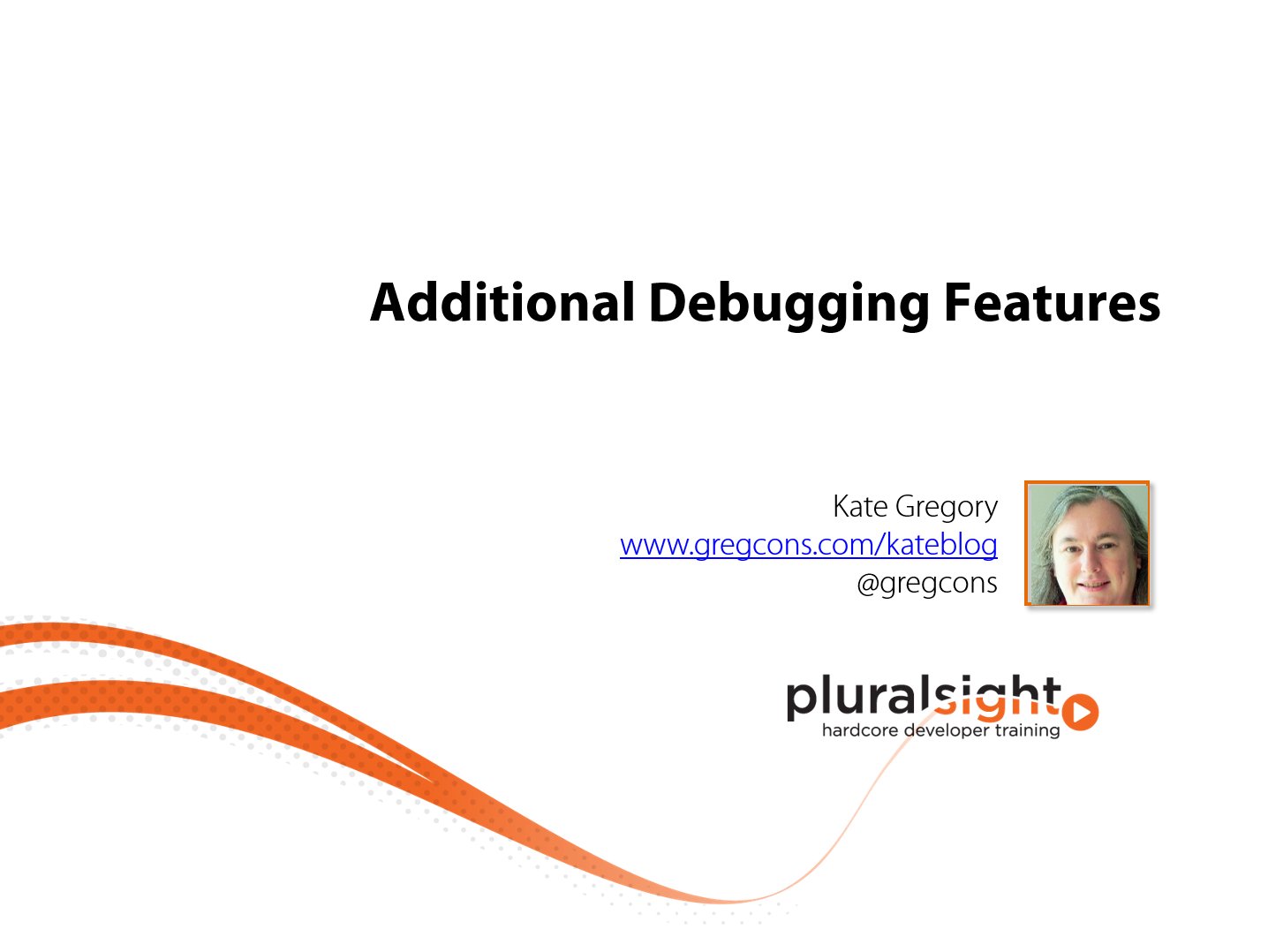 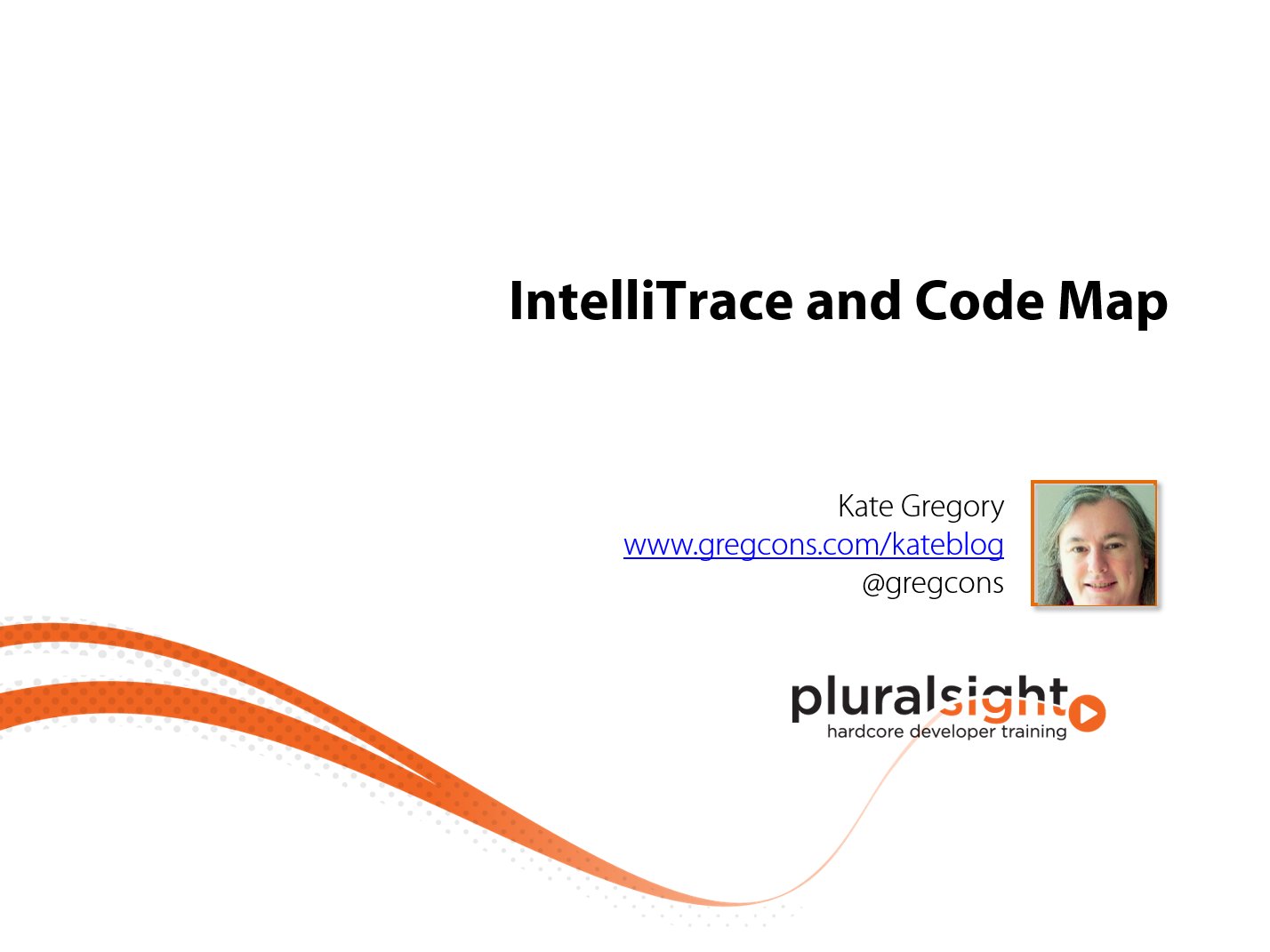 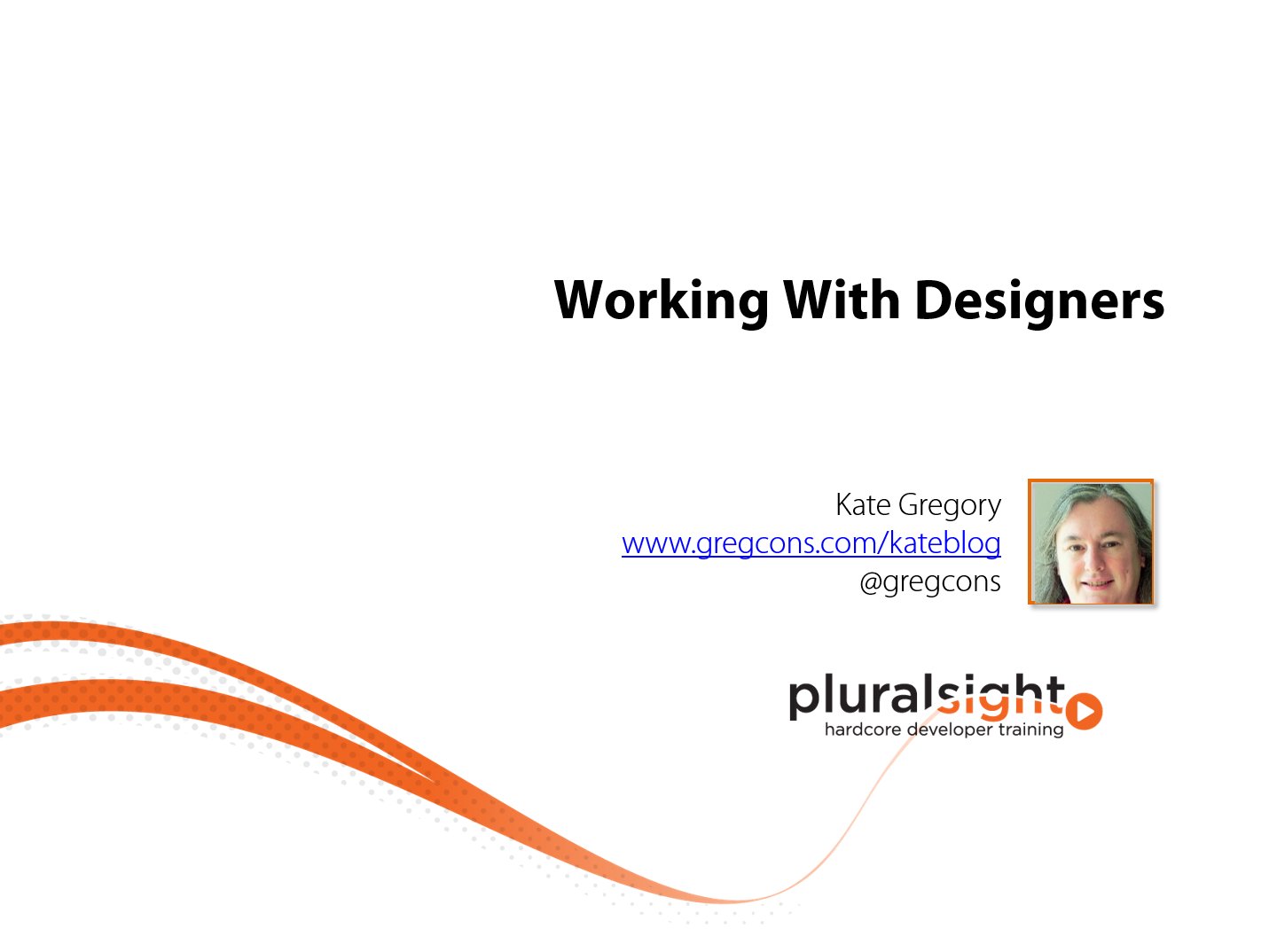 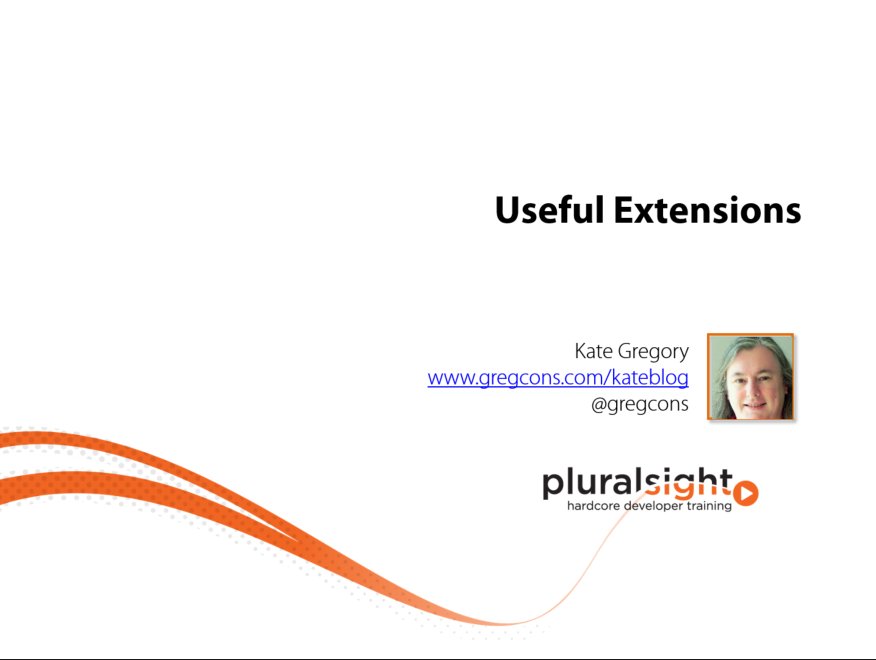
This was fun to put together and it's nice to get into things so many people don't know. I hope you take a look at it once it's live and learn from it!
Kate
 Wednesday, 30 April 2014
Do you think Agile and Enterprise can go together? Are you a senior .NET developer who is looking to lead? If so, a client of mine is looking for you. Their job description includes: We’ll look to you as a team leader who embraces a solid leadership capacity that has truly valuable impact on our team. In this senior role, you will participate in all aspects of the software development lifecycle including planning, technical design and architecture, construction, documentation, testing and deployment. Additionally, you’ll have a big picture view and the opportunity to play a role in the design.
and they're expecting: - Proven and deep experience with different versions of .NET Framework and C#/ASP.NET development
- Demonstrable experience working on N-tier architectures
- Solid understanding of the full development life-cycle
- Knowledge and experience with Agile development methodologies (e.g. XP, Scrum)
- Champion of agile engineering practices (e.g. TDD, continuous integration, refactoring etc)
- Good understanding of design patterns and their application
- Experienced unit testing frameworks
- Computer Science (or related) degree
- Knowledge of/experience with Sitecore is an asset
- Knowledge of/experience with Ektron is an asset
- Knowledge of/experience with Sharepoint is an asset
Sounds like you? Then get in touch with me and I'll make an introduction. Kate
 Monday, 17 March 2014
Office Lens went live in the Windows Phone Store today. I happened to have a list of things to do on a whiteboard in my office, so I gave it a try. I had already taken a picture of the whiteboard to transcribe but I went back to the board with the app installed to see if I could save some time.
Here's the picture Office Lens took (resized to 400 pixels wide) 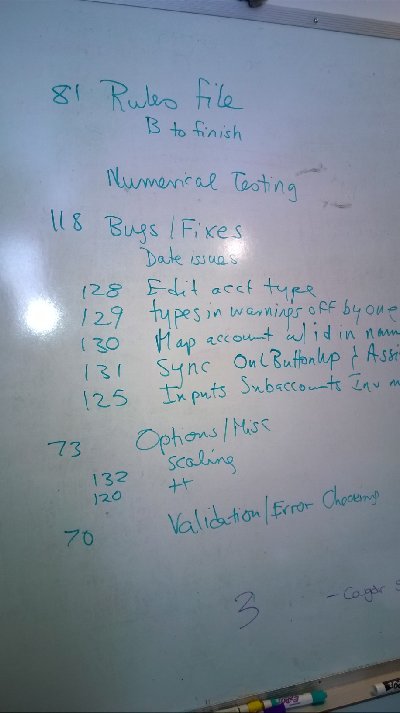
Here's how that looked when Office Lens cleaned it up and put it in a OneNote document for me (I copied the picture out of OneNote, cropped it and resized it): 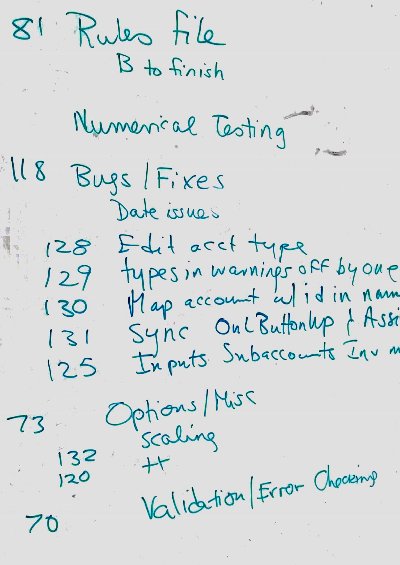
Much nicer - the glare spots are gone and the background is cleaner. The skew that resulted from taking the picture on an angle (a defensive action to keep the glare out of the important parts of the image) is also gone. As is, this can go into an email. If my handwriting was neater, One Note could have tried to extract the text from it. But this is a lovely improvement and Office Lens is free, so why not give it a try? Kate
 Friday, 07 March 2014
Over the years I've used a lot of tools to get screenshots. My old standby is Paint Shop Pro (copyright 1991-1997 it says on the splash screen, and I recall I deliberately didn't stick with an upgrade that introduced complicated stuff I didn't want, like layers.) I like it because I can set up a time delay for a shot which lets me get tooltips and the like ready when the capture happens. Alas, on this Windows 8 machine with a second screen, something confuses Paint Shop and it doesn't capture the whole screen. I experimented a bit with the Snipping Tool that comes with Windows, but it doesn't have a time delay or a keystroke, so I can't get tooltips, context menus, or anything else that requires me to interact with the app before the shot. I got desparate and started using the PrtScrn button on my keyboard. Your keyboard probably has one. I often type Shirt-PrtScrn but I just checked and the Shift is unnecessary. This captures the whole screen (or both if you have two) and puts it in the clipboard buffer. From there I can paste into whatever I edit images with (usually Paint Shop to be honest) and then crop to the part I want. So far this is boring. I mean really, this is what you could have done TWENTY YEARS ago. And it's been fine for me except that cropping part. But yesterday I learned about Alt PrtScrn. It gets you just the current window! And if you let go of Alt before Prt Scrn, the alt is not passed along to the underlying app either. This is going to save me some seriously annoying cropping. Kate
 Friday, 28 February 2014
I have updated my Visual Studio Pluralsight course for Visual Studio 2013 and Part 1 is now live. It covers features that were newly added in the 2013 release as well as older material (so you don't need to take the 2012 courses before you take this one.) It focuses on how to work Visual Studio rather than on the mechanics of a particular programming language or framework. The demos are all in C# but almost all of it applies to other languages equally well. (As C++ developers know, some things we don't get, but we're used to that.)
A number of people who've been using Visual Studio for years have reported to me that they decided to watch the course just to see what features I felt were worth covering - and then accidentally learned something! Chances are you will, too, so why not watch on double speed and see if something comes up you didn't know before? Kate
 Sunday, 23 February 2014
I was invited to speak to some Imagine Cup contestants in Calgary and delighted to accept. I spoke to the teams informally for quite a while about judging and judges and general team tips. I was really happy to see some teams from previous years so I could hear what happened after they entered. If you're a student (undergrad or grad) and would like to enter, there is theoretically still time, but realistically it would have been better to start several months ago since you do have to build working software. Why not take a look at the contest (there are over a million dollars in prizes, and you can get a cool trip somewhere and meet some industry high flyers) and start pulling together a team for next year? There's a pretty good introduction for Canadians on the Microsoft Canada blog. For those of you who were at the sessions, here are the slides I used in the afternoon. I talked about the new C++ features and why they matter, and demoed C++ AMP as a great motivator for using C++. (I wanted to upload the pptx files, but they're too big for the blog, so I've exported PDFs.) Kate GregoryCppAMP.pdf (1.65 MB) Cpp11and14.pdf (556.51 KB)
 Wednesday, 01 January 2014
I'm a January 1st MVP, which means that while dealing with email that has piled up over the holiday break, I'm usually surprised to find my MVP renewal amongst the hundreds of other messages coming in. This year is no exception. 
According to the MVP blog, there are 1011 of us awarded today. I'm happy to be included once again!
Kate
 Thursday, 28 November 2013
In a word, it was exhausting. But it was also cool from a technical point of view. Here's a still of us I grabbed from the video recording: 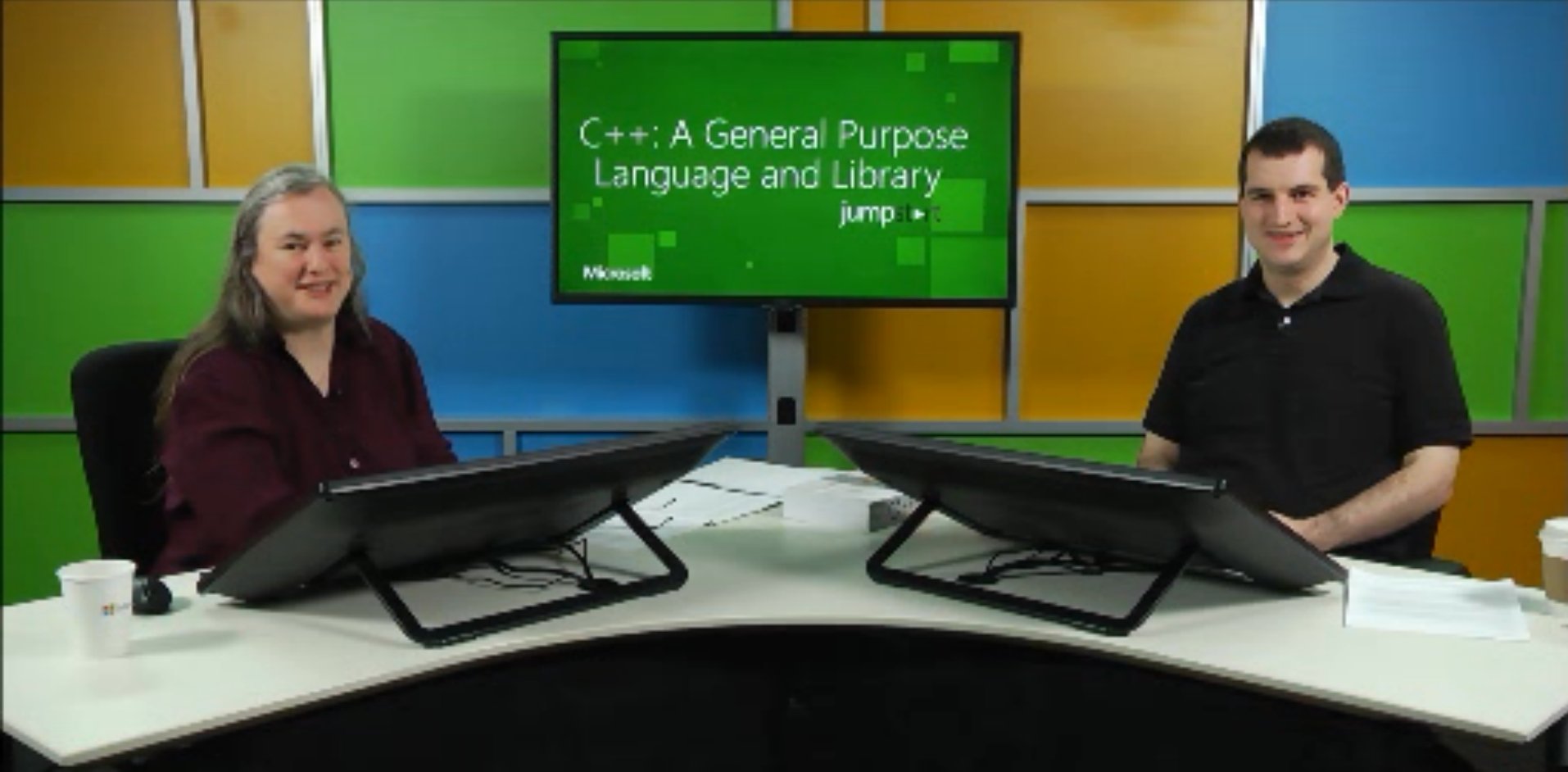 The screens in front of us are touch screens. I forgot how much fun it is to demo Hilo on a touch screen. Here's how it looked from my side (sorry about the lunch mess): 
And a better view of all three cameras:  You can see that part of my job was to imagine people who wanted to learn C++ on the other side of those cameras. And finally, here's James hard at work getting something onto the demo machine:  I believe this picture immortalizes the moment he tweets about here: 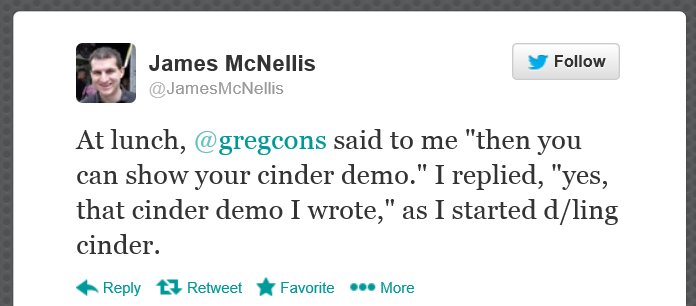 Great day and good fun. Hope everyone learned a lot! Kate
 Wednesday, 27 November 2013
Channel 9 has all 7 pieces of the MVA Day I did with James McNellis available online now! 
We went very fast through this one day introduction. If you'd like a slightly saner pace, please check out my Pluralsight courses, C++ Fundamentals and C++ Fundamentals - Part 2. If you're not a programmer, and you'd like to "begin at the beginning" with C++, try Learn How to Program with C++. There is a free trial for the Pluralsight courses to get you started. Kate
 Saturday, 23 November 2013
The C++ Jumpstart full day event on Tuesday was a blast! James and I really enjoyed ourselves and from the looks of the chat room, so did the attendees. We had literally thousands of people registered for the event and in a few weeks the recording should be available (check http://www.microsoftvirtualacademy.com/Live-Training-Events for a recording link - scroll past Live Events to Recorded Events) for even more people to view. Kate
 Friday, 22 November 2013
I've been busy this fall with the release of Visual Studio 2013. One of the things I've been working on is live now: a new Pluralsight course. I focused on new things that matter to C++ developers, whether that's compiler support for language changes (hello, variadic templates!) or IDE changes that were implemented for C++ as well as "the other languages". Here's the description: The C++ Language and the Standard Library both changed dramatically with the release of C++ 11. Some of these features were not implemented until Visual Studio 2013, and those are presented in this course. You'll learn about variadic templates, improvements in constructing and initializing variables, and rawnstring literals. In addition a number of productivity boosting enhancements in debugging, editing, and using libraries are in this version and you will learn how to take advantage of them.
If you don't have a Pluralsight subscription already, there's a free trial available, so please check it out! Kate
 Monday, 18 November 2013
Are you joining us tomorrow for a one-day introduction to C++ at Microsoft Virtual Academy? (No? There's still time to register.) Then you might want the sample code we'll be using. We're probably going to go too fast for you to actually follow along in your copy of Visual Studio, but you can try. I've attached a zip of the code to this post. Kate Demos.zip (164.55 KB)
 Tuesday, 12 November 2013
A lot of people (a lot) have asked whether the November 19th session (a whirlwind tour of C++ for those who don't know it) will be recorded. I'm happy to confirm that it will be. On the Live Events Page for Microsoft Virtual Academy you will see both future and past events. Here you can register for our session, and about two weeks afterward a link will appear on this page to let you watch the recording. Please help spread the word to people you know who want to learn C++! Kate
 Wednesday, 06 November 2013
If you know someone who wants to get started using C++, and has done at least a tiny speck of programming in other languages (so I don't have to explain what a loop is) then you might want to point them at this free online event:
C++: A General Purpose Language and Library
Attention developers: here’s a painless way to learn the basics of C++ from the ground up, whether you’re updating legacy code or writing brand new, efficient, and high-performance code for new platforms like phones and want to take advantage of C++. You’ll learn the fundamentals of the C++ language, how to use the language and its Standard Library effectively, and how to use the Visual Studio environment for developing C++, including debugging, exploring code, and understanding error messages. This is your starting point for building software in C++.
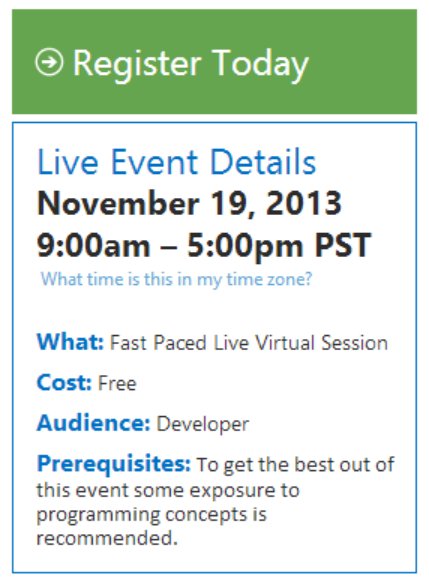
James McNellis (of the Visual C++ team) and I will spend the day walking through the fundamentals of the language and the Standard Library. We're going to have a great time. Please send us some beginners to keep us company!
Kate
 Wednesday, 02 October 2013
In yesterday's session, I showed a Windows 8 store app that loads an image and then draws an animated ripple over it.

If you would like to get the code, and more importantly the documentation that explains the code, it's on Codeplex. Mixing and matching a little DirectX into your Windows 8 C++/CX app is remarkably easy, so why not take a quick look?
Kate
 Tuesday, 01 October 2013
I am months behind. I will post some of the stuff I've been meaning to post, but later. Right now I need to make new entries so people can get current information. Remember, never blog about why you're not blogging. Just blog.
 Wednesday, 03 April 2013
As it says on the Bristol GGD website: Our April dinner is being held on Thursday 11th in conjunction with the ACCU 2013 conference. The event starts at 7pm for 7.30pm, at the Bristol Marriott Hotel City Centre. A few female IT professionals will talk briefly about themselves and their jobs. There will then be time for discussion and networking. Read more and register http://girlgeeksataccu2013.eventbrite.co.uk/
I can't wait! I'm delighted to be one of the speakers and I'm looking forward to meeting lots of new people.  All are welcome, whether attending ACCU or not. Men are welcome at all GGD but are asked to come in the company of a woman so that women can experience being the majority. Kate
© Copyright 2026 Kate Gregory
Theme design by Bryan Bell
newtelligence dasBlog 2.3.9074.18820   | Page rendered at Saturday, 07 February 2026 18:49:46 (Eastern Standard Time, UTC-05:00)
|
On this page....
| | Sun | Mon | Tue | Wed | Thu | Fri | Sat |
|---|
| 25 | 26 | 27 | 28 | 29 | 30 | 31 | | 1 | 2 | 3 | 4 | 5 | 6 | 7 | | 8 | 9 | 10 | 11 | 12 | 13 | 14 | | 15 | 16 | 17 | 18 | 19 | 20 | 21 | | 22 | 23 | 24 | 25 | 26 | 27 | 28 | | 1 | 2 | 3 | 4 | 5 | 6 | 7 |
Pluralsight Free Trial
Search
Navigation
Categories
Blogroll
Sign In
|